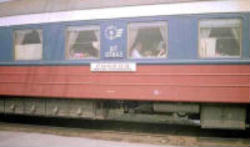
As well as some touristy material, there are economic and social insights, from early in the recession to the realisation that immigration was becoming something of a preoccupation in the West.
The old blog technology has worn out, and so have the observations. So here is much of the recovered old text, with photos, giving the server a bit of space.
It starts up in an oil city in western Siberia at the onset of the Great Recession (with a Christmas in Elets, European Russia), moving to a small town in eastern Siberia, thence to Minsk the capital of Belarus, with a visit to Kiev, capital of Ukraine, and a brief sojourn in Vilnius, Lithuania, then Wielun in Poland.
Sorry, no pictures until April 2009; people started to complain.
The blog covers my life in Tyumen, western Siberia, where I will be teaching English as a foreign language. Please feel free to add comments, including requests for more information. Personal questions, however, should be sent to me by email.
I am catching the 15.15 Aeroflot flight from Heathrow on Saturday November 29th. This is due to reach Sheremtyevo 2 in Moscow at 22.05, switching to Sheremtyevo 1 for the 00.40 flight on Sunday morning, reaching Tyumen 5.25 am.
Brief notes: border security a lot more friendly than they used to be. Odd seeing airports with smoking zones. Aeroflot food not as good as it was, although I guess delays at Heathrow 2 didn't help. Internal flight from Moscow to Tyumen on an old Soviet plane. Flight messages transmitted in Russian and English, but latter incomprehensible; simply read out, reader having no knowledge of English whatsoever.
Generally people are friendlier than they used to be. Driving seems generally a little less harem-scarem than in Elets, i.e. they're not turning corners at mind-boggling speeds. Having said that, I almost got assassinated by a boy-racer on the pavement showing off to his girl friend.
Flat pleasant, hot running water, central heating - I'm not used to that - all ok. Best wishes to all.
PS Went to shop in a supermarket; about seven pounds for very few items. mainly food. Ok, I live in the centre of a very corporate town, but I gather that prices have generally risen since I was in Russia in the summer. Poor ordinary people...
PPS Another local shop is a little cheaper but still very expensive. First day at work; suddenly temperature has dropped: over the weekend, was just freezing, now about minus 15 I think. Hat and coat now necessary.
C
Although I've mainly been living off fruit recently, I decided that some fat was in order given the cold snap, so I have supped on a good lump of kolbassa (Russian sausage). Back to muesli tomorrow morning, with kolbassa for lunch before I go out for an afternoon and evening's work.
After an evening's teaching, I got home at about 10 o' clock, to find that I couldn't get into the house. There is a special entry panel on the outside; one has to get through that before climbing the stairs to the flat. So I had to wait for somebody to come out before I could enter. According to the guy coming out, who repeated his message twice in Russian to make sure I understood (of course I didn't), that I should phone somebody up. I think the local council have changed the panel, as of that very day. Anyway, the office at work are on the case, so I should be able to enter my own house soon.
I've been looking all over for nail scissors. I don't want clippers as they don't work for me. I spoke to a colleague about this. Her theory is that perhaps they all have manicures. Mine is that the possession of nail clippers may be a psychic no-no on a par with shaking hands in the doorway and spinning your hat on your finger (the Russian equivalents of walking under a ladder, only held to with much more seriousness).
The weather was warm today. I.e. It wasn't below freezing and you could walk along the pavement without entering an impromptu skating exhibition.
Then I thought I'd take in a meal at the first cafe I found beyond my office, before getting on with my lesson preparation for a lesson with a businessman I see on Sunday afternoons. This calls itself Pizza Express, although I don't know if it is part of the franchise. There I got talking to a Finnish man. He told me some interesting things.
There are more millionaires in Tyumen than anywhere else in Russia. (NB This is the main city for oil and gas in Siberia.) One can see a variety of luxury cars in town and as I think I said in another entry, more eating places than you can shake a stick at and some very state of the art supermarkets, with a variety of western goods. As I rather suspected, I am paying more for my goods because I live in the centre; if I get a bus out, when I get to know my way around, I should be able to buy Russian goods considerably cheaper. Ordinary people get paid half of what I get, or perhaps less than that, so there is no way that they can buy in the town centre. The people out in the countryside are believed to live in horrendously poor conditions. Round here, the centre of Tyumen, is mainly for executives, big business people and expats.
When I said dusvedaniah to my Finnish acquaintance, who also doesn't speak much Russian (he's here for two years), he told me that we could meet again at Pizza Express. That's where most of the expats go. No doubt it offers a feeling of being at home. Also, the food is a decent deal: my large and quite pleasant thin pizza and a cup of tea with lemon cost me about five pounds. Having said that, I doubt if I'll be in often, in spite of the price, as I tend to prefer to immerse myself in Russia and Russians. Still no internet at home, but this should get sorted soon.
In many shops, razor blades are only sold in packages with the razor holder. In other words, people just buy a new razor every time a few blades are exhausted. Many shops only sell bedside lamps with bulbs in situ, but no spare bulbs. Bulbs can be found if you look around, but it looks as if there really are people who will throw away a lamp when the bulb blows and get another lamp. Perhaps the old joke about selling a car when the ash trays are full isn't a joke around here.
Which brings me round to the lighting in my flat. The chandelier in the living room uses up to six lights. The kitchen has as many short strip lights as a small classroom. And the bathroom has a whole load of bulbs embedded in the ceiling; this I haven't seen outside the homes of the exceedingly well-off. As you will imagine, I am even more punctilious about turning off lights when I'm out of a room than I ever was. Oh well, if one will live in the centre of town.
Which is a good thing in terms of being able to walk to work. It takes me only 5 minutes to walk from the flat to work, a small suite of rooms in a hotel converted three classrooms, a staffroom and an office. This journey I do in my bargain Lidl walking boots, fortified by new fur insoles. When I get to work, rather than suffer the indignity (and the creation of more waste) of wearing blue plastic spats to avoid muddying the classroom carpets, I change into a pair of ordinary shoes. Occasionally when leaving work, I forget to change back into the clodhoppers, as my work shoes would be perfectly normal attire for British shoes. Today was such a day and I received a sharp reminder of the error of my ways: I slipped on the ice and fell over backwards. Fortunately, my winter coat cushioned everything except my dignity.
It's just got cold again, well between about minus 3 and minus 5, and it should get a few degrees colder over the next few days. It has been quite balmy over the last few days; well, a few degrees above freezing anyway. Up until now, I've been wandering around with just a coat and shirt on (really must remember things like underpants). I'm hoping that this means that I won't feel too cold when it gets to really cold temperatures and I've taken to putting on a jumper and perhaps even a thermal vest (and socks, they would be good).
Please keep adding comments. It's good to know that I'm not just writing to empty air. Cole.
The queues of cars vary from Ladas to a variety of western cars, to 4 by 4s, up to 4 by 4s that look as big as tanks. A lot have blacked-out windows, but I think some of this is a style issue. People are relatively disciplined in this part of the world, most drivers respecting the right of pedestrians to cross on a green light without undergoing a motorised trick or treat.
I've been looking all over for nail scissors. I don't want clippers as they don't work for me. I spoke to a colleague about this. Her theory is that perhaps they all have manicures. Mine is that the possession of nail clippers may be a psychic no-no on a par with shaking hands in the doorway and spinning your hat on your finger (the Russian equivalents of walking under a ladder, only held to with much more seriousness).
The weather was warm today. I.e. It wasn't below freezing and you could walk along the pavement without entering an impromptu skating exhibition.
My boss bought me some nail scissors. Apparently Tyumen has a good old haberdashery.
I find that the Russians eat ice cream throughout the year, so I had some. Cherry flavour, with bits of cherry in it: yummy.
Not much else is going on. All the best. Cole
In the meantime, I haven't been able to get money out of the cash machine. My bank said the authorisation software was down or something like that. I've been to the bank three times now without success so I've had to take an advance from my employer for the holiday season. It has been made quite clear to me that if I make serious inroads into that, I'm on cabbage soup or bread and water for the following month, whichever is the cheaper. Happy seasonals!
PS I've just found out that one implication of the water being cut off is that the central heating is off too. Off to bed before I lose too much body temperature...
Anyway, I am teaching day this afternoon and then catching a plane to Moscow early on Tuesday morning (December 30th) I'm off on holiday to Elets, not returning until the late evening of January 9th. This is almost certainly my last entry of 2008.
Within the four weeks that I've been here, Tyumen has changed. When I first came, I only noticed two beggars on the streets: a middle-aged woman with a big poster saying 'HELP' in Russian standing outside the hotel where I work and an old lady who prays while rocking on her knees on Ordzhonikidze Street, a major shopping street. Now various men have joined their ranks, some, such as a man with crutches, waiting silently for alms, others approaching people with varying degrees of forthrightness. Some of the begging is clearly alcohol-related, but unemployment is rising and I expect considerable misery here.
A few weeks ago, the building workers of Tyumen started to lose their jobs. Now the blight is widening. A group of my students run a restaurant chain in Tyumen; they report drastically falling custom. I rather think that even those with jobs are generally hunkering down and eating at home, the traditional Russian way of life. This does not mean that they won't be socialising, but this will take the form of visiting one another's homes for dinner.
The weather today was very mild, dropping from -9 this morning to a balmy -7 this evening. Who knows, I could be sunbathing when I get to Elets. I wish everyone well over the festive season. Dusveedaniah!
PS I recently saw Lenin's statue from the rear. He was looking a little less casual, with his left hand a little apart from his body. "Ok, I show you Americans who can and who cannot do the fast draw."
PPS Monday morning: it's a beautiful sunny day and a pleasure to walk to work, even if it's slushy. The temperature: - 10. Beautiful.
The return journey from Elets to Moscow was on one of Russia's distinctive trains. For once, the person who checked my ticket on boarding wasn't interested in looking at my passport; that's one of the things about Russia, it's a conservative country that is always changing. You lay down in either the 'plotzcart', a dormitory carriage, or a cubicle for four people; it being busy at New Year, I was booked in to a cubicle; this wasn't very expensive (about thirty pounds), as knowing I was going to be waiting a long time at the airport, the vendor had sold me a slower than usual train. The cubicles always remind me of the violent scenes in From Russia With Love although my room-mates seemed more intent on smoking themselves to death outside the lavatories than garrotting anyone. Which reminds me: although there are such civilised titbits as being served tea in one of those little decorated metal glass-holders, the two lavatories, one at either end of the carriage, tend to be less than salubrious places to have your wash, which you definitely need to have after a night on the bunk bed. It's even worse in the plotzcart where people have to queue up for this dubious luxury. The concierge on my carriage didn't speak a word of English and I didn't understand a word of her Russian, but she was basically helpful and was effusively nice when saying 'dasvedaniah' (au revoir) on the platform.
Less pleasant are Tyumen taxi drivers; my favourite was the one who decided at the airport that I was a rich man and insisted on more than twice the going rate for taking me into the town; upset at being caught out by somebody who was not a newcomer to the city, he unleashed a wave of invective. Having been married, I understood all of it and made him understand that more of the same was likely to give him a flat nose. The price duly halved. After the fumes and bustle of Tyumen, I appreciated Elets' considerable elegance and open rural spaces more than ever. Elets has a nineteenth century town centre, pretty much unspoiled; even the soviet-style estates on the outskirts offer plenty of open spaces between blocks for children to play and adults to hang out. Which reminds me: people in Elets and Tyumen do actually stand around smoking and talking in the minus temperatures.
In Elets, people may have got themselves bigger places to live, with teenagers actually having their own rooms, but they still use only one light bulb per room (as opposed to the festival of lights in Tyumen), with just a small chandelier in the living rooms. Rooms are more old-fashioned in Elets, usually wall-papered.
New Year is a two week long break, punctuated by dinner parties at each other's houses. Wine, beer and spirits are consumed in large quantities. The spirits offered to this soldier included the inevitable vodka, some home-made whisky, some samogon (potcheen) and, I found out after I complained of its rough taste, surgical spirit lifted from the local hospital.
One of my drinking partners is a Russian who has returned to his home country after a long period of time in the US and the UK. Something he said rings true to me. He is forever getting comments from people in the west suggesting that one is likely to get robbed or murdered in Russia. On the other side of the fence, Russians tend to think that the grass is greener elsewhere; until they spend some time in the west, they don't appreciate that higher wages are not that special when paying for higher prices. Having said that, the lower wages of most Russians mean that they would have trouble coming here on holiday when they meet the high prices directly.
On to food. Russia is awash with what my brother refers to as 'grandpa food'. My grandfather was keen on food such as pickled herring. Having said that, a few too many meals here would probably lead even Harry Boy to make his excuses and search out the nearest pizza restaurant. As well as meat or fish (or whatever) in aspic, there's dried fish and there's raw fish and cabbage soup and oh, I don't want to think about it. However, even the locals have taken to the nickname I've given to one of their popular party pieces: the Purple Beast. This looks like a cake in a dish, with a purple and red top (made from beetroot and beetroot juice); underneath are layers including egg, pickled herring and I know not what else. This is one of the better dishes. (My preferred dishes include blinni, aka pancakes, which have a range of fillings; pelmeni, which is the Russian answer to ravioli; and cutleta which are large meatballs.)
Christmas is a low key event, by the way, occurring in early January. Somebody told them that this is a religious holiday. The things Brits have at Christmas - prezzies under the tree, Father Frost (yep, that's Santa), etc - are all New Year events. This demonstrates of course that Christmas in the west was a pagan festival taken over by the Church.
In case people haven't had enough of a booze-up, I'm told by a colleague back in Tyumen that there is also an 'Old Year's Night' to be celebrated sometime later in January. Me, I'll give my liver a rest. In the meantime, my computer has acquired itself a hacker; this and other complications may require me to use a different email address. I'll keep people posted.
Before I caught cold, I spent some time being shown new flats to live in. Some were terrible: peeling paint/wallpaper, furniture that looked like it had been salvaged from a skip, etc. When one guy was asked if there was a phone, he said 'two days'. This technically means that he could have one put in quickly, but is a joke way of saying 'no'. Anyway, I refused to make an immediate choice and suggested that they ask to look at some others rather than just keep their particular estate agent friends happy. In the meantime, I allowed in potential buyers of the flat at which I currently reside. As it was, my prevarication allowed an offer to be made by a buyer who wanted to rent out anyway, so I can stay where I am and the same telephone number remains. The only downside of this is that I still have the same internet system, which is still causing me problems. I hope to sort this out soon but for the moment am still reliant on the computer at work.
The temperature seems to oscillate. Minus twenty to minus twenty-three with a wind was quite unpleasant; when I decided on a detour from my usual journey from work to home (between 5 and 10 minutes work depending upon the conditions) in order to visit a fruit kiosk, the short walk combined with removing my gloves for the transaction meant that I lost the feelings in my fingers by the time I reached home. I'm told that in the severest weather, I should be moving from gloves to mittens. Presumably, keeping the fingers together means that the extremities are kept together to preserve body heat. At other times, it is a balmy minus one. One wanders around without a care in the world...
As well as my own site, CareerSteer.org, the free career choice test to assist people with career choice,
there is also the very informative Life in Tyumen website
and Ferrers' internationally renowned Pork Pie Blog
Nothing else is happening. Other than my having coffee at the flat of the only black couple in Tyumen. They don't seem to have the usual problem of racism, as in places like St Petersburg. It's more a case of the perils of celebrity. They are forever having to stand around having their photos taken. Ok, here's one with me, now can you do it with my kids, etc etc. Apart from the tedium, there's the little point of doing all this posing at subzero temperatures.
For fruit, however, I've given up buying supermarket stuff and use a local kiosk specialising in the stuff. As it is the vendor's sole product, it means that however expensive the fruit, it is at least of acceptable quality. The pears are rather good, with green apples coming in a decent second. Mandarins tend to be of variable quality. I invested in a packet of Tunisian dates; these were costly but a nice change. The vendor, a middle-aged man from Azerbaijan, told me that it was ochen kholodna (very cold) and insisted in coming out and unfolding my hat so that it covered my ears. A good thing too, as I found out when I got to work that it was minus thirty-three degrees and that I had developed frostbite on my left ear (which my scarf had failed to cover sufficiently).
Unfortunately, I can't always tell the difference between when it is minus 20 (cold) and minus 30 (very cold) until I have been out for a while. I must work on this. Today (minus 19), I wore my knitted gloves inside my ski gloves; not bad, although I was still feeling cold when I got to work, so mittens would still be a good thing.
In the meantime, my employers have received a shock rent increase which has implications for whether or not they can continue to afford to employ me. I guess although I might be a draw as a 'native speaker', they already have one long-established Englishman working here and both of us are very expensive (they have to pay rent for an apartment as well as paying a salary). So I may be back in Blighty rather earlier than expected. Am looking at other jobs heading eastwards, but we shall see.
Shortly after resigning, I was offered a new job, teaching in another part of Siberia. From what I can see, the job is better paid, with lessons only taking place from Monday to Friday instead of the six days I currently work. Also, I have somewhat fewer teaching hours. The job looks more secure as well, as the school has established links with the local university and connections with an American exchange project. More details when I get there.
Anyway, I finish work on February 13th and travel back to London on Sunday February 15th. I hope to head east again in late March for an April 1st start to work. So I may take a few weeks off writing the blog.
I went out for a walk into the city centre a couple of nights ago. Although I was walking through heavy snow, the weather seemed very warm. I ran into a colleague who told me that the temperature was minus fifteen; it was merely the fact that we've got used to minus thirty that makes it feel like sunbathing season.
Because of the number of spammers I have had to kick out of the comments section, I've now had to tighten up the comments section by setting things up so that an email address is required for those who wish to add comments. Sorry for the inconvenience. If I have to tighten more, again, I'll update the blog.
Sending packages across Russia is very cheap. My two packages went off together for less than a tenner. "That's a bit less than ten pounds", they said. Well, no, they asked for 487 roubles. All that including a tailoring service.
My analysis of the economic situation here was absolutely right. According to different teachers, various students have stopped coming in. People here are working shorter hours and being paid accordingly. Still, at least Russian firms are generally trying to keep their people on wherever possible. Having said that, it is as I predicted in December: learning English is of course a lesser priority when compared to keeping your family fed and the bills paid. So, I think if I hadn't already resigned and found a new job, I would be having to do so by now.
Re comments: because my tightening of arrangements does not appear to stop spammers, I have now set the comments to 'members only'. I hope this doesn't stop real readers making comments, but it is very tiresome clearing away hundreds of rather inappropriate mailings.
Sorry again about this but it takes ages to remove all the spam.
The economy is sliding further downwards here in Tyumen. When I first came, the bubble was still clearly well inflated, with razor blades being sold only with new razors and such like signs of conspicuous wastefulness. Then came an increase in begging. Now I see something I haven't seen since St Petersburg quite a few years ago: an ever-increasing number of stray dogs wandering the streets.
Something that I meant to write about but never got around to was some of the Russian vocabulary which is shared with English, but of an antiquated type. A muslim is a mussulman; I've never seen that outside of pre-modern literature. Black people are nigrers; this is official, akin to negro and indeed, you will come across 'nigra' in old American texts. My favourite, however, is their name for a bicycle: a velocipede.
I have removed the comments facility from the blog because of too many problems with spammers, privacy issues relating to the searchability of the web content and the point that is primarily for people to read about Siberia. I've now renamed the blog 'Living in Siberia'. The Tyumen items are still available in the archives.
People wishing to contact me can still email me. Those who don't know my email can find a way of contacting me by going to the main www.careersteer.org web site.
The town in which I live, Berdsk, has been radically affected by the existence of hydroelectric power. The town centre of centuries-old Berdsk had to be moved away from its previous site. This being the case, the town centre is essentially a twentieth century construction. Having said that, you don't have to go far from the centre in any given direction to pass the beautiful wooden buildings of old Russia.
While we're on the subject of old Russia, we may return to our old friend Mr Lenin, statues of. Unlike the Lenin of Elets and Tyumen, poor old Lenin stands in a side street. In some towns, it would appear that Lenin was removed in disgrace. However, a number of the citizens in Berdsk campaigned for his reinstatement. Apparently there is strong support for the Communist Party in Berdsk. As is usual in Russia, the elderly predominate. Having said that, a relatively young colleague remembers that when she went to university in the days of the Soviet Union, people from the countries of central Asia, Jews and others were all treated the same, as fellow students; clearly, this is not completely the case in today's sullen world.
My new flat is on the ninth floor of a nine storey block, in the town centre and only about 8 minutes walk from work. Today, it's got the internet. I shall be emailing people with my contact details, including a London number which you can call. I got this from Skype, which specialises in cheap telephone calls (free between Skype users).
Here are a few miscellaneous comments to finish off with. The town centre is a rather a friendly place. Ok, nobody speaks English, but they seem to view foreigners with a poor grasp of the language as a source of amusement rather than in the grumpy manner that characterises some natives in other towns. Ok, they carry on spurting out Russian in spite of your obvious linguistic weaknesses, but then they're not used to us. In the meantime, English teachers are rather less tolerant of their charges. I am told that a student who spent time in the north of England, consequently coming out with some pure Anglo-Saxon vowel sounds, has been told in no uncertain terms that he won't pass his spoken examinations if he continues to speak using improper pronunciation. (Yes, I have.) Anyway, it would appear that some people are trying to preserve traditions, perhaps against the rising tide of Americanised accents, but their attachment to the Home Counties is a step further than touching.
I went to the Post Office (the 'pochta') today to post some clothes to some hard-up people in Elets. (I gather that the recession is worsening for people there; while they were previously on four-day weeks, now I think more are getting the push.) This time they wouldn't consider using my box. This was unceremoniously emptied and put into a blue Russian Pochta box, which I had to pay for. This was wrapped around with blue RP tape and, amazingly for four kilograms of gear, cost six pounds all in. (That'll be six quid, they might have said. But they didn't.)
Also amazingly cheap was my first visit - apparently subsequent visits are cheaper - to the dermatologist. This was a private clinic so I had to pay. Nine quid. Wow, of all the grasping... (JOKE). Clearly, prices here are a lot cheaper than Tyumen. Which reminds me, there is less of the waste that characterises Tyumen. The rooms in my flat each have only one bulb; indeed, the kitchen light is a low energy bulb (presumably the last tenant spent a long time there). Also, you can go into any shop to buy razor blades; if you remember, one of the strange things about Tyumen's throw-away society was generally being offered a whole new razor rather than packs of blades. Also, Berdsk doesn't seem to have anywhere near the number of 4 by 4s that Tyumen has.
Last night, I went to visit a colleague's family. Brown beer was consumed, and jolly nice it was too, along with sauerkraut and fried potato with mushrooms, which was yummy. I bought some Portuguese tawny port for them from the supermarket. It was expensive but at least was something new for some of them. The evening degenerated into discussions of the ills of societies east and west and the nature of superstitious customs. Then I wended my weary way back to my flat, via the park near the town centre. This included walking past a disused ferris wheel. Its state of neglect stems from its having been the site of an incident which received worldwide coverage. A toddler fell out of the contraption and was killed when another child was able to start the unsupervised ferris wheel turning. I believe that people are going to court over this. Dusvedanyah.
Unlike Tyumen's tank fleet of 4 by 4 vehicles, most people in Berdsk travel in Japanese cars, Ladas and small western cars, in that order. Japanese cars are chosen because they are amongst the cheapest of foreign cars. I think it's also possible that imports may be easier given Japan's proximity to the Russian far east (Vladivostok, etc). The biggest splashes normally come from the local buses. These are minibuses with a reputation for reckless drivers; as well as showing a certain disregard for lane etiquette they certainly seem less concerned than most of the car drivers at the prospect of showering pedestrians with brown floodwater.
Now the ice banks have disappeared, the activities of the preceding autumn become clear. On the ground, as well as a considerable amount of general litter, I see quite a lot of used condoms. While I find the idea of all this al fresco socialising a touch bizarre, it's reassuring that people are at least trying to be safe in some ways.
Let's move from copulating to shopping. It's only now that I've moved that I realise how much Tyumen catered for western tastes. Apart from a decent range of booze - still no bitter, however - and some ready sauces, such comfort food as fish fingers are not to be found, as opposed to selections of pickled and dried fish, beetroot salads with pickled herring and some foods I am unable to classify.
My colleagues have discovered me lunching on piroshki (pies with the external consistency of doughnuts) two or three times in a row. I think they're rather good. The fillings include egg and onion, chicken with something or other, apple, potato with something or other, cabbage and other things I don't recognise or really want to think about much. Anyway, I have been roundly told off for living off 'junk food' and have been marched off to the school cafeteria. Unlike other food in the town, this was amazingly cheap and good. I had shchee (cabbage soup) with a lump of cream on it and a slice of bread, followed by cutleta (a meat cutlet) and cabbage, followed by boolichka (a fresh roll with jam inside) which was yummy. All for 40 roubles, a bit less than a pound. I'll have to swear off the pies.
I don't know if Gazza and eating all the pies are known expressions here, but it wouldn't surprise me. After the third occasion when a student asked me which football team I supported, I shocked the fourth student rigid by guessing, rightly, that he supported Manchester United. The last three football fanatics also had been.
I went to Novosibirsk today to help buy textbooks for the school. Lenin was a decent size, I am pleased to report, unlike his rather modest effigy in Berdsk. Novosibirsk is a huge city, probably one of the five biggest in Russia; only the massive Moscow and its rival capital, St Petersburg, clearly dwarf it. It's a rather ugly place, but it has a certain attraction for many teachers of English. I suspect that this has more to do with the night life and opportunities to eat a range of cuisine than the charm of the place.
On the way back, I was quickly driven around Akademgorodok (literally, academic city small). Built in the nineteen fifties as a way of concentrating the talents of the Soviet Union's scientists in the face of the Cold War, this has all the facilities of a city. It was felt that the least that could be done for the sequestered scientists was to give them a place with all mod cons. The ugly academic blocks and student residences - top secondary school students in physics still find themselves here - are all separated from each other and from facilities such as swimming pools, theatres and shops by rather long walks or bus services. Also possible are short cuts across the forest. Much of Russia is still forest, although road development makes inroads into this.

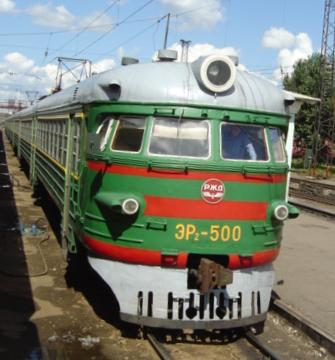
I always find the corridors of Russian trains to be evocative, as I sit on a fold-down seat unsleeping, or look out of the window while waiting to go to the loo, or pass my tea stuff or sheets back to the lady at the end of the carriage.
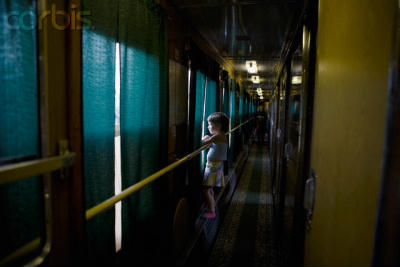
Traditional holder for tea glasses in a Russian train.
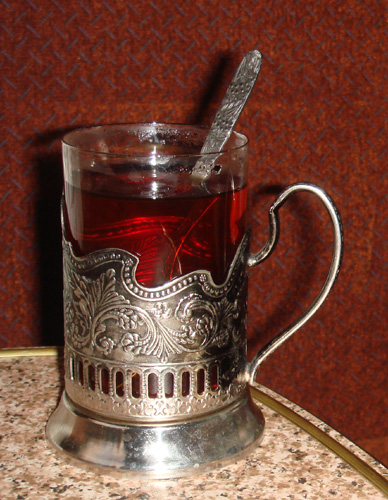
And more hot water from the samovar at the end of the carriage.
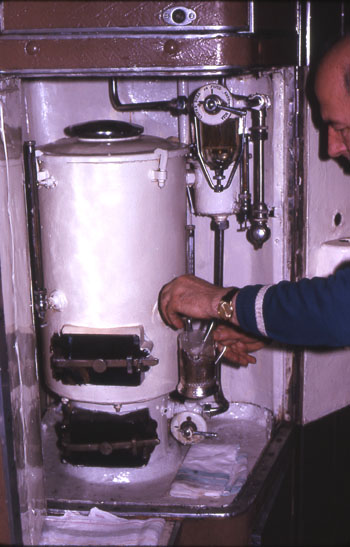
The worse part of the train is also at the end of the carriage; the sink is also in the same horrible room, which is usually worse if you have to queue because you're in...

The plotzcart, the semi-open dormitory carriage.
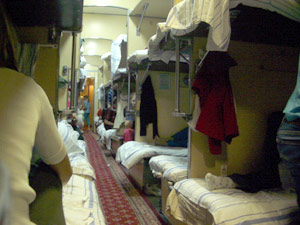
The four berth cabins are more expensive.
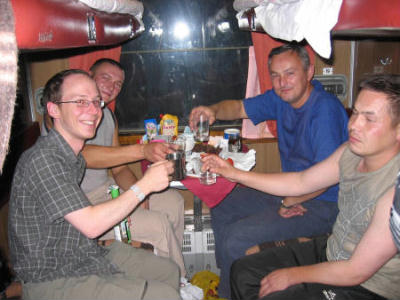
I don't know the people in this picture. I haven't included the more expensive dual-berth cabins as I've never used one.
And now, to the beauties of the Moscow metro:
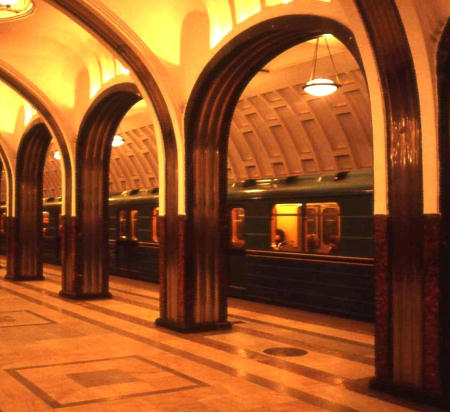
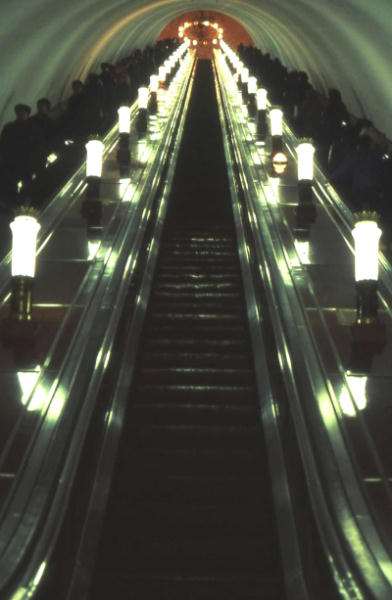
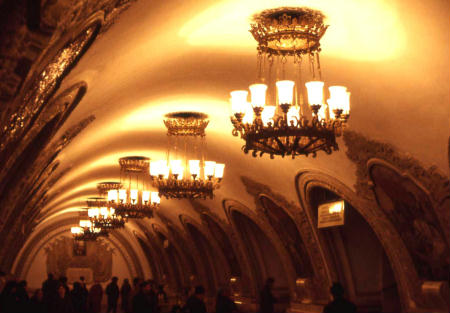
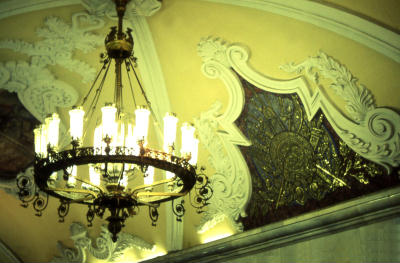

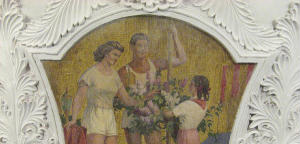

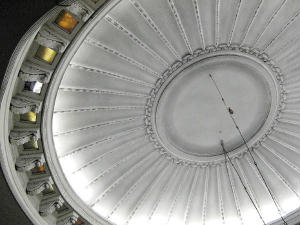
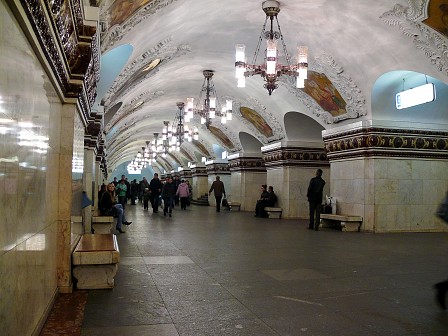


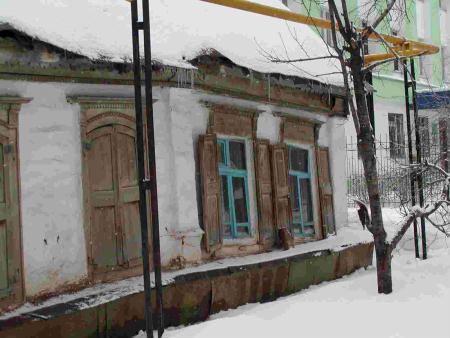
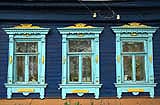
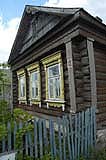
As well as storing firewood for barbeques and solid fuel heaters, some even use it to heat up the content of another shed: a banya. A banya is a Russian sauna, rather similar to a Finnish sauna according to Wikipedia; completely unique according my students. (What's the difference, I asked. Well.... you get hit with twigs. I guess that would appeal to some types.)
On one of my visits, I found myself with a traditional vodka drinker. Our bottles were kept cool by being lodged in a mound of snow. They didn't last long, each glass being put down the hatch in one go. Well, gentle reader, I spent the night asleep in the bathroom.
In a more sober moment, I walked way down my street, beyond the children's playground and the local cinema, until I reached the cathedral. Like many cathedrals, this was built in 1992.
The Transfiguration Cathedral in Berdsk:
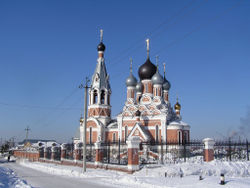
Later, I saw Taras Bulba in the cinema. This bloodthirsty epic follows Gogol's original very closely. People who have criticised its lack of reality should blame Gogol himself, as the silly defending Russian soil death speeches were in fact in Gogol's second edition, where he moved from Ukrainian nationalist to an appeaser of the authorities. The attention to detail of the film is to be applauded, as battle scenes, clothing and conditions are a lot more authentic than the Hollywood original (even if you choose to forget Tony Curtis' performance). One interesting thing is a scene which didn't appear in Gogol: in the Hollywood version, Bulba bathes his baby son in the river as a test of hardiness, while this film has it as a baptism. Closer to Gogol than the Hollywood version, this modern version makes some attempt to show the antisemitism of the times. Gogol himself describes the Jews in scathing terms, although one does wonder if the second edition was again laying things on for the authorities (themselves the secret authors of the Protocols of Zion), as Gogol also expresses admiration for their prodigious intellectual abilities and openly deplored the violence against Jews in cossack areas. Gogol also notes the very lowly position of women in this particular society.
You won't be too surprised to hear that, aside from the speeches of the dying warriors, I am unable to comment on the quality of the dialogue.
Berdsk apparently has a strong Communist presence. Before these people are condemned as totalitarians, some things should be considered. The regime which the west associates with oppression and death was one under which they lived almost all their lives. Also, they remember the times of liberation as the times of complete economic degradation; in many cases, this has not improved significantly. Also, living was comparatively civilised in many ways; certain social problems which we recognise as the symbols of current society were not noticable under communism. And as some of my younger acquaintances remind me, the USSR was not the same creature for all of its seventy-odd years lifetime. The nation of Khrushchev, Brezhnev, Andropov, Chernenko and Gorbachev was not the same as that suffering under the terrors of Lenin and Stalin (note that Lenin set up the idea of terror as a way of managing social change). Similarly, although corruption and abuse of power was a reality, so were certain socialist values, such as internationalism, equality and a devotion to education. Some of this ethos is still valued by educated Russians of different generations.
Anyway, returning to the park, it should be noted that only a few grandchildren and the occasional son or daughter joined the elders amongst their red flags, hammers and sickles and slogans. Later in the morning, the band was replaced by a speaker. As he mentioned Mr Putin and Mr Abramovich and the administration all in one paragraph, I rather think he wasn't very satisfied with the current state of play. The crowd had a few onlookers as well as yours truly. Some were the local police, who looked very relaxed, perhaps just there to check for any granny-elbowing. As most Elets bus passengers will know, it is the grannies (a granny is called a babushka, by the way) who do the elbowing. A little less comforting was a youngish man in a baseball cap with a video camera. I suppose he could have been recording the meeting for posterity, but he didn't look all that celebratory in mood. Well, I found myself within the sweep of his viewer, so I gave him the cheeriest smile. I don't want to be a party pooper.
There may be a more specific protest, however. Apparently, there is an independent brigade of special forces (GRU) in Berdsk, which the government is thinking of abolishing. Communists and other non-government parties are apparently protesting against this reform, as it could mean the loss of hundreds of local jobs.
In the afternoon, the less politically inspired revellers took over and had a good old fireworks display. The late evening, presumably when all respectable gendarmes are in their cups, is devoted to tyre screeching. The local lads turn up at the back of the park with their jalopies and do handbreak turns which are deafening.
I saw them at it as I emerged from the local cinema, having watched some Russian-made hokum about a post-catastrophe future. People were quite happy on a diet of impossibly violent fights, car chases and climbs up and down tall buildings. Which reminds me: having seen the deliberately mindless violence of the remake of Taras Bulba and having pondered the question of Gogol's attitude to Jews, I read some of Gogol's short stories. Interested as he is in suffering in Russian society as a whole, he doesn't concern himself with Jews unduly, but such jewish characters who appear on the peripheries of his stories are treated without sympathy. I think it reasonable to say that the antisemitism detectable in Taras Bulba was not a mistaken impression. My most recent visit to the cinema was to see a western film, something about a superhero called Wolverine; it was reasonably absorbing nonsense.
During the colder weeks, I wondered about the presence of car tyres lying on their sides in the grounds surrounded in a quadrangle by the terraces of blocks of flats where I live. Recently, I've seen respectable looking people moving them around and rooting around and today, one of them was whitewashing the top surfaces. Having also seen these outside a school I occasionally teach at, I now know the secret. They plant flowers and maybe vegetables or other plants within the tyres. A matter of taste, I suppose. I shall try to export some tyres to Hampstead Garden Suburb and see if it takes off.
I am sorry that nothing else has been posted in the last few weeks, but I've been inundated in work while my colleagues were away. In addition to my usual adult evening classes and my upper level adolescent classes, I have been taking on lower level younger students, aged about 12 to 15 and in some cases a right handful (but quite fun). Anyway, that's finished, so I'll be back to my usual workload, perhaps with a few classes visiting the other youngsters who haven't had my company yet, including some little ones. The little ones already know me in passing, so when I am in the school across the way, I get helloed and goodbyed again and again and again. Still, that's celebrity for you.
I am the only native English speaker here in Berdsk. Even in Akademgorodok, the huge town devoted solely to the Novosibirsk State university and to scientific research, native speakers actually living there (as opposed to visitors) tend to be American, so I get called up for events now and then. ('English' people are rather more popular as a nation in Russian than Americans. As usual, of course, generalisations are the stuff of these prejudices.) I go to improve my Russian in a conversation club, but of course I am also there to contribute as a talking head.
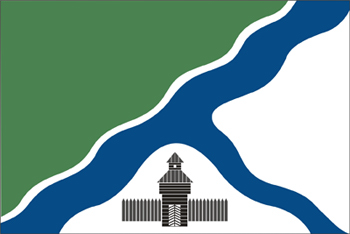
This is of course the Berdsk flag, the town being situated on the confluence of the flooded Berd river and the great river Ob. The centre of Berdsk was moved because of deliberate flooding in order to harness hydroelectric power. Hence the town centre, instead of being full of centuries-old buildings is a boring set of twentieth century structures. Also, no doubt, hence the existence of the 'Ob Sea', shown here in the form of a map, a picture of it under ice rather as I stumbled over it on my arrival and also a picture of it one April; no I haven't any idea what he was doing.
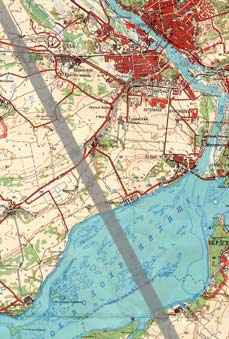
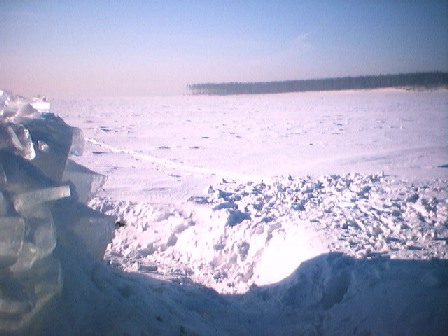
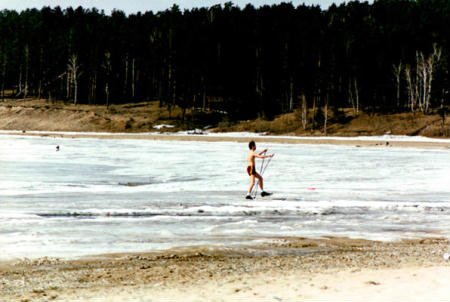
As my employer and two other colleagues will be in Britain on a course for the next fortnight, I shall have a considerably increased workload. This being the case, you're probably going to get internet photos, probably of Elets and Tyumen, in subsequent blogs. Best wishes to all. Cole.
I twice tried the so-called Chinese restaurant in Berdsk town centre. It had been recommended by a couple of acquaintances as a really good place. The fact that one of them spoke highly of their offering generous portions should have stood as a warning in itself. Essentially, the restaurant played safe by cooking Russian food and - perhaps - cooked it in soy sauce. It had all the oriental trimmings in terms of ornamentation, although chop sticks had to be requested. On my second visit, having tried to find something that they couldn't mess up and received chopped beef mixed with frozen peas (mercifully cooked), I didn't have the heart to order chop sticks. On the way out, the girl dressed in Rupert Bear style Chinese clothes, who was actually from Kirgizstan, told me that I spoke excellent Russian. Yes!!! Sold to the restaurant at the other end of town.
I resolved to find the second Chinese restaurant. One of my evening students told me which street it was on, so I decided to go the day after my long stint of overtime was completed. As I did not where exactly on Krasnaya Sibeer the restaurant went, I walked the long way, along the main road of Berdsk, Lenin Street (Ulitsa Lenina), a street name ubiquitous in Russia. When I reached the end of Lenin, I walked half a mile along a connecting road before reaching Red Siberia.
During this part of the walk, I realised why I had been advised to take a bus. The road being on the outskirts of town, the traffic moved at high speed. Apart from the usual low level nuisance of the dust being blown in my face, I also had to cope with cars swerving to avoid the potholes. After a winter under ice, the roads receive significant damage and this year, with economic retrenchment the name of the game, repairs are not happening in a hurry. One minor loss of control by any of these cars on this remote road with no formal pavement and the local anatomy school would have a field day.
Fortunately, the Pyekin (Peking) restaurant was just at the start of Red Siberia. Inside what looked like a bit of shed with a dragon sketched on the outside, a rather impressive looking restaurant could be found. Tables were situated within cubicles, akin to the long-lamented snug rooms. Classical music played, although this soon gave way to pop music. Sumptuously decorated with the usual Chinese fans and what-have-you, the tables were clean and chop sticks were arranged next to the western cutlery. Along came a pleasant Russian blonde with the menu. She checked that I knew what I was about. I explained that I knew about Chinese cuisine. She said, however, that it was more important that I understood words like pork, beef and mutton (svenya, gavyardina and barannina). Ah, I thought, no Chinese names, sounds like the place in the centre. As I looked at the menu, my heart sank further. 'Moscow Surprise', I read; I thought that the only surprise would be if the food had any resemblance to a Chinese meal.
Well, I played safe and ordered a fish soup; at least if it proved to be Russian fare it would be a decent thing to eat. Beef in soy sauce was to follow; surely this couldn't be messed up too badly. Well, the soup came in a tall tureen and I could serve myself. I had two bowls of it. And it was good. Spring onions and sliced fish in a clear soup; really quite good. The beef in soy sauce was rather salty, but served as it was with thinly sliced beef, sliced onions and red peppers, I couldn't complain much. It wouldn't have won any plaudits in Highgate, but following on as it did from the faux Chinese of the city centre, I felt like offering a standing ovation. A twenty per cent tip had to do in its place.
I opted for a walk back. I was able to take a direct route as I knew what part of Red Siberia I was on. The street I walked along was part of old Berdsk, with the characteristic cottages in varying states of repair. One had been converted into a church by having two minarets built on a new roof. This was towered over by a new wooden slatted church. Before I reached modern Berdsk, with its characterless blocks of flats, I was greeted by two men drinking beer outside a beer shop. I walked in and asked for a dark beer in a stakan (glass, in this case a plastic one). The taps were behind a bar in a small room, where there was a little standing room but no seats. Some customers bought the beer in canisters and took it home, others drinking outside; presumably the latter would quaff it standing inside when the winter comes. A couple of other customers used their English on me and I explained that an Englishman would probably rather die than eat the dried or smoked fish which they were also buying to eat with their beer. (Russians are no doubt rather bemused by our not eating with our beer.) I asked for a dark (tyomni) beer. Rather taken aback by having to negotiate with a foreigner, the barman gave me back all of my money with my change and thanked me when I explained his mistake and returned fifty roubles. The beer, called cheshkower, was also rather good; it actually tasted like a fair to moderate English bitter. I put my neck around it and we exchanged dosvedaniah's.
I walked on until I reached the corner of the central park, walking past the lethal and now disused ferris wheel and back home. The atmosphere is very dirty tonight; I don't know if it is fire, or industrial pollution or just the end of the world coming. Oblivious to all this, dozens of young women are sitting on park benches, talking and drinking bottles of beer. Up to now, by the way, people have been wandering around in coats in spite of the clement weather. Elena says that it is typical that I think I'm right and everybody else is wrong; I'll regret it when I get pneumonia. I'm sorry, but this theory they have - including the medics - that you can get a cold merely from being cold is not true, proven by research. Oh well, that's one of the challenges of being a particularly silly foreigner.
Berdsk has a memorial arch on the square, with four giant metal soldiers bearing the cross-beam. Instead of a coffin, however, there is the inscription, Niktah Ne Zhabit, nobody forgets. Boys and girls from the school across the road from the language school are dressed in khaki and in shifts of five, four troopers and a leader, are put on guard under the arch, surrounding an eternal flame set in the ground. The four troopers wear a kalashinikov across their chests - these weigh a lot more than they appear to do - and stand there for 40 minutes, when they are replaced by another little squad. In front of them is the platoon leader, who leads them to the monument, walks up and down in front of them and reports to the officer in charge.
Although senior veteran soldiers, dressed in khaki and covered in medals, are in charge of the entire event, the man who is in charge of the logistics is a relatively young veteran. Small and fit, he is dressed in a black uniform, bareheaded, with the red beret of the special forces tucked into his left epaulette. This is the man who meets me at the memorial. After he invites me underneath the arch to see the names of the many Berdsk residents who died in the war, we walk behind the square to an iconic monument; around this, fireworks are being prepared late in the evening.
When we return to the arch, the squad leader reports. The officer supports a white-faced squaddie away from the eternal fire. As the platoon leader replaces him under the arch, we support the adolescent down the steps and I sit with him while the officer makes new arrangements.
At another point, I am marched into a barely furnished flat on the estate, devoted to youthful military affairs. Although invited in by the black-uniformed officer, I am scrutinised on the way in by the top man, who bears a disturbing resemblance to Ratko Mladic, the Bosnian Serb war criminal. "Anglishchanan, bratti na voyna", Englishman, brothers in the war, I announce. He nods and lets me through.
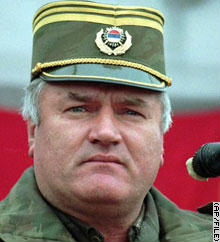
When the latest squad of young people have been marched off to the eternal flame, I am ushered into a room where the boss and other veterans sit. Whereas my special forces comrade is a Chechenya veteran, most of these are from the days of Afghanistan, although one older man just might have been from the Great Patriotic War itself. They sit eating kohlbassar (salami), pickled fish and peeled apple slices. As I join them, vodka bottles are pulled out as if from nowhere and we toast. As usual, the glasses of vodka are downed in one go. Not again, I thought, my night in the bathroom of a month ago still fresh in my mind.
The head man started to complain about Roosevelt and his failure to create a second front. I explained that while FDR had in fact wanted to make war on Nazi Germany, Congress had not. I felt it my patriotic duty to point out that Britain had formed the first front; he acknowledged the famous war in the air (aka the Battle of Britain). A recent pronouncement, by a rather controversialist historian, that the Soviet Union had been a de facto ally of the Nazis prior to Hitler's betrayal, was one that I decided to omit from these proceedings.
Later in the evening, another school providing the guard of honour, I joined the special forces man's friends for shashlik (marinaded and barbequed meat) and beer and vodka. On the way home, we stop at the beer kiosk so that I could buy some beer from the Siberian town of Barnoul. The beer is quite like bitter. The driver stops in the middle of the street for this errand. I guess today of all days, nobody is going to think about quarrelling with this uniform that declares him to be the toughest of all.
The younger citizens at the barbie were rather inclined to confuse American with British culture, no doubt because of Hollywood. I became a touch bored with the term 'mxthxrfyzker' and explained the principle of the Glasgow kiss (the headbutt delivered in Scotland to the verbally negligent). Anyway, I managed to pour some of my toasting vodka on the floor; this was only spotted by my host's wife who was in any case quite pleased not to have to look after me as previously. Towards half past ten, we walked towards the memorial ground and watched the firework display. Although shortlived, this was beautiful.
When I returned home, the young people of the town were celebrating by competitive car-revving. These automobile-based pursuits vary from Saturday night to Saturday night. As well as a recent screeching competition created by hand-brake turns, another night was devoted to musical tunes played by security alarms. This was a particularly annoying routine, as it could be played at home. Oh well, I got to sleep sometime in the morning.
In the meantime, the usually thorough medical doctors seem to be in collusion with the traditional belief that not being well-dressed is the way in which colds are perpetuated. This is of course against all scientific evidence. That this is well-entrenched in the national culture was obvious recently in the locals' attitude to the gradual warming of the spring. I had contact recently from an Englishwoman in Tyumen, still waiting for the central heating to be turned off while experiencing summery weather. (It was only turned off in Berdsk last week; I kept wanting to go to sleep in the flat.) Up until late last week, all the Berdsk residents were wandering around with their coats on.
My friend reported that people in Tyumen were still doing the same thing, with the children running round in the playgrounds with woolly hats on. Her tot has started a new kindergarten and they rebuke her when she takes her to school without the requisite coat, woolly hat and ski pants. The locals considered me mad for the same reason.
One of my students was wearing a pullover in class and, on her way out, she donned a coat as well. This was this week, with temperatures to be expected at the height of a typical English summer. Maybe they've been watching the film, 'The Day After Tomorrow'. No doubt at some point in the afternoon, the temperature is going to drop dramatically, ice will climb the blocks of flats at an alarming rate and we'll be burning books in the living rooms quicker than you can say Dostoevsky.
As I had been experiencing problems with the electrical mains, my employer's husband came armed with some pliers, an ammeter and a big bottle of beer. Beer first, work later, he demanded. In the face of our consternation, Zhenya pointed out that beer was not alcohol. Now, before you see this as just macho posturing, once again, it is worth looking at how well-entrenched yet another part of Russian culture is.
In the dictionary, there is the word 'peet', meaning to drink fluid in general, and 'vippit', to drink alcohol. In the latter case, however, this alcohol does not encompass beer. The same interpretation is reflected in legal practice; as in the UK, supermarkets chain off the sections devoted to wine and spirits after a certain time in the evening. The beer shelves, however, remain open alongside all the other foodstuffs.
Maybe this explains the death rates on the roads, which are much worse than ours. Clearly, people can drive around with several litres of beer inside them in the firm belief that they haven't been drinking.
More of a problem to me tonight was the absence of a drinking hole on a Saturday night. I found a couple of billiard halls where, if I wanted, I could sit at the bar drinking a lager. One of these was called The Triumph; as there was nobody else there and my first and second choices were unavailable, I apologised and started my long walk around the town. I could, along with the rest of the population, go to a beer 'bar' where beer would be poured into a large plastic bottle to be consumed at home. Or, as has actually happened after two hours of walking about the town, I can sit at home with a bottle of Chimay trappist beer I rescued from a supermarket. This place is desperately in need of a pub. There are some good beers around, not all of it lager; they just need somewhere civilised (or even uncivilised) to quaff it in.
I think most people drink at home with their friends and colleagues. Maybe I'll find out about cultural events up in cosmopolitan Akademgorodok and spend more time up there. It is a 15 minute, 15 rouble minibus ride (about 30 pence), so there is no reason why I shouldn't, if I can find out where the events are advertised.
I think I ran into somebody who had had a long day today however. After work, I went into a small old-fashioned shop where I knew I could buy some good beef kolbassa (salami) and fresh bread, but it is all behind a counter. I stood for five minutes while one shop assistant served a man who wanted a big fish. The other three assistants found various things to do, all of which meant avoiding the only other customer in the shop, i.e. me. When I finally had the attention of one of them - 'yes, it's me and yes, I would like to buy something, pretty please' - I asked for bread. "Klep, pozhalista" (bread, please). Now, the word is officially spelled 'kleb', but I've been told and read that the b is softened to a p at the end of words. However, my interlocutor decided to be intransigent over the matter of formal linguistics, saying something along the lines of 'we speak **xx%* Russian here, sonny boy, it's kleBB". "OK, KLEBB," I said; it was almost nine in the evening and I wanted my supper. "Which do you want?" I pointed to a piece of bread behind the glass; as there were only four types of bread left there, it was quite obvious which I wanted. The name of the bread was hand written and I had forgotten which letter was represented as a capital letter; the latter are florid objects with little resemblance to other variants of the letter. I think she realised that I was having difficulties, but insisted on waiting for me to tell her what bread I wanted. "VOT ON" (here it is), I said, pointing again. With bad grace, she picked up the little loaf and dumped it on the counter.
"Eta trudna?" (this is difficult?), I asked.
"Da, eta trudna".
"Well then, darling; please also give me some beef sausage." She corrected my pronunciation of the word beef and gave me some sausage. I think she realised that she had been rather obdurate and warmed a bit. We engaged in some normal conversation. When she found out that I wasn't speaking Nemetski (German), she explained that she had never learned English. I said that I had rather gathered that and explained that I had been working hard at teaching myself Russian from a book. She gave me a grumpy grunt of a goodbye. The sausage that she'd given me turned out to be rather tasty.
There are Russians from different ethnic backgrounds here, and one can see mixed marriages amongst the young and old. However, the foreigner is distinctive, probably because of dress habits. Those from other countries are treated differently by some, although I get the idea that most Siberians are more liberal than many of their compatriots in St Petersburg and other western cities.
As I think I've said before, I am generally communicated with in a friendly manner, by people who do make the effort to understand my attempts at speaking Russian (my grumpy friend at the old-fashioned supermarket notwithstanding; I have subsequently found that my attempt to soften hard consonants at the ends of words is not unreasonable, but just doesn't apply to khleb, the word for bread - learning the hard way).
And no, I don't think that the friendliness is merely financial calculation. One watch repairer, having mended my watch strap, said he didn't expect money (I gave him 100 roubles, a couple of quid). Others are hardly making a fortune out of me and will bring out tape measures when it becomes clear that I probably wouldn't know my own size at home, let alone in Russia.
I am only conscious of being diddled by one vendor, on a fruit stall. Another vendor, at a beer shop, was delighted when I returned the cash after being overcharged; ah, now I know why his colleague wouldn't take payment the next time I came in and swigged some brown beer. Being the only foreigner had made it easy for the message to be transmitted.
A few things stand out, however, about being foreign. Supermarket security staff look as though they may have an annual competition for looking fierce and querulous. It should be noted, however, that they have any losses deducted from their pay. After a while, however, the older ones begin to realise that my bolting for the door with an armful of yogurt and shower gel is a touch unlikely. I do get followed by younger staff quite regularly though, sometimes I think to the detriment of their coverage of the rest of the store. Yesterday, however, is the only occasion when I have seen even sharper coverage of the dodgy foreigner. I was heading towards the beer section when I found the youthful security guard already there and making no pretence at being otherwise engaged. I had been preceded by three migrant workers, dressed in their working clothes - for decorating or construction work - who were cheerfully putting bottles of beer in their shopping baskets. Ok, they were rough looking, but otherwise cheerful and innocuous and obviously in gainful employment, so I think the vigilance was rather xenophonic, if not downright racist.
Another minor annoyance is that somebody has told the free newspaper sellers that I am foreign, so they no longer leave them in my mailbox, which is a nuisance as I had to experiment with a number of paid-for newspapers before finding one that tells me about events in the Novosibirsk area. No doubt they think that I couldn't possibly work out what it's all about or maybe I would develop a mental health disorder by all this culture shock.
As I say, however, this is generally a liberal area, with a high standard of education. Now I know when and where the events are - using Komsomolskaya Pravda (the former word is a hangover from the cultural-politics of the Soviet Union, the latter means truth) - on Sunday, I'm off to a music concert (French and Russian) at Akademgorodok, House of Scientists, followed by contributing to the university English group as my voluntary contribution to society, followed by an hour and a half of conversation in Russian about some intellectual topic or other. Recent topics have covered space travel, with the focus on Russian cosmonauts but not ignoring American efforts (and discussion of conspiracy theories, yes, the 'did they land on the moon?' as a firm favourite - we would of course like it not to have happened, in the spirit of rivalry, but as I pointed out, it would probably take more of an effort to cover things up over the years than to make sure the landings took place), and also a lively debate upon the European Union and implications for human rights in Russia. Although there are reasonable attempts to show where Russia gets things right, and they certainly feel that the - largely American - view of the Soviet Union as being a totalitarian regime thoughout its seventy year life cycle is rather a daft one, they are well aware of abuses and powerlessness and are interested in what makes the European civilisation work (remember, although the students are mainly European racially, with a fair sprinkling of others, they are Asians geographically). Based on readings and meetings with the European Council, the main speaker considers human rights legislation to be a cornerstone. I suggested that some of this is based on a longstanding struggle to ensure property rights and equality before the law. (If you are interested in the latter subject, you can find a recording of the Radio Four programme In Our Time on the internet; the recording about the influence of Magna Carta down the ages was of great interest to me. According to recent historians, the Magna Carta did not fall into desuetude over the coming generations. Although it was indeed to preserve the rights of barons, this was not the apparently obvious process of 'big boys first, little boys later'; the barons wanted to recover from the grasping King John what was officially already on offer to the common man - well, free man anyway. It was the fact of a written law which bound the monarch which was crucial for later developments, including the independence of America.)
Several Russians are involved, as they enjoy the debates, as well as supplementing their knowledge of English by hearing my English questions about the content.
One more thing I've noticed is the interest in Japanese culture amongst the people in these climes. It makes a change from Anglocentrism. Some people, shop assistants and students, wear t-shirts with Japanese motifs and Japanese wall-hangings are not uncommon. I have met at least three teachers of Japanese in Berdsk town.
The continued boom in learning English does not mean that everybody wants to come and live in England. Many would like to enjoy their travels more and enjoy the internet more fully (remember that English is the main language of the net), and it is also the lingua franca of international business. English has prestige. Some people also learn German and Italian.
While I'm here, just a note about the things one misses. Pubs. Now I've been provided with a toaster, marmalade and peanut butter. (Some expats miss marmite; it's all right, but I can't say its absence bothers me yet.) Going for a curry. A good Chinese; the one on Red Siberia is authentic, but it still wouldn't go down a bomb in England. There are signs that the Russo-Chinese restaurant in the centre may be changing its act. They were selling some snacks in the foyer yesterday and the food was really Chinese. Ok, I'll try again soon.
If people want to make suggestions about things they want to hear more about, they can contact me via email. I would suggest coledavis at hotmail dot com. (The breaking up of the email address is to defeat electronic spammers.)
I went to join the university Russian and English discussion groups on the banks of the Ob Sea for the end of year barbeque (shashlik). Our conversations, including people from Korea, Japan, Russia, China, Belgium and France, covered a range of topics. The Buddhists think that the Dalai Lama is a conman; we like him in the west because he smiles a lot (like the Americans). They tell me that my pronunciation of kleb as klep is correct, regardless of what the shop lady said. They just don't like my pronunciation of the first syllable, which should be ch like Scottish loch or Hebrew ch. Oh well, I can't win.
It is a pity that the Ob Sea is very dirty. I think sewage is pumped directly into it. Also, people leave bits of broken bottles on the ground. I tend to put the bits I find in the rubbish bags with the barbeque detritis; some people however, in spite of the annoyance of having it embedded in their feet, just throw the glass with disgust onto another part of the beach.
On the beach there was an interesting division of labour. The Russian men turned up with charcoal and food (i.e. the resources). The Russian women prepared the meat, putting on the sauce and putting the lumps on the skewers. The Koreans tended the fire and the westerners came in from all quarters with pieces of driftwood for it. The Americans did not come to the beach at all. They seem to have a bit of a reputation for complaining about not having the same facilities here in Russia that they enjoy in the US. (No, this clearly does not extend to all Americans, but is a bit of tendency.)
Prior to going to the sea, I visited some English teachers and their students. They feel that there is a better standard of living in the UK. I don't think they realise that although we can save more quickly for one-off purchases such as air flights, the cost of rents (or mortgages) take up much of British people's wages. Maybe if we relaxed our visa system, England would lose its allure. People do what they do here. Also, as I explained, poor people in England can observe all the wonders of London, but that doesn't mean that they can enjoy many of them. One of the more realistic complaints - which I still hear regularly - is about corruption, especially about judges being easily bought.
It's humid in Berdsk at the moment, so I'm just working in the evening and wandering around in the day very very slowly. My dermatologist is trying out different things on me for my psoriasis; another reason to take it easy: all these drugs wandering around the system.
We also spoke about politics; nobody in this group wanted tsarism back. One came up with media chit-chat about members of the British royal family, but could not advance a reason why they should want one.
Novosibirsk is a modern city but is quite stately in its way, with great straight roads and tasteful roadside trees and garden furniture. The monuments are on a large scale, as befits the largest city in Russia after Moscow and St Petersburg. Whereas Berdsk's Lenin is life sized (and regularly provided with flowers by the nostalgic populace), Novosibirsk's is a giant. Similarly, the statues showing Russian warriors from three different epochs are life-size in Elets, but here they rightly tower over a visiting Englishman.
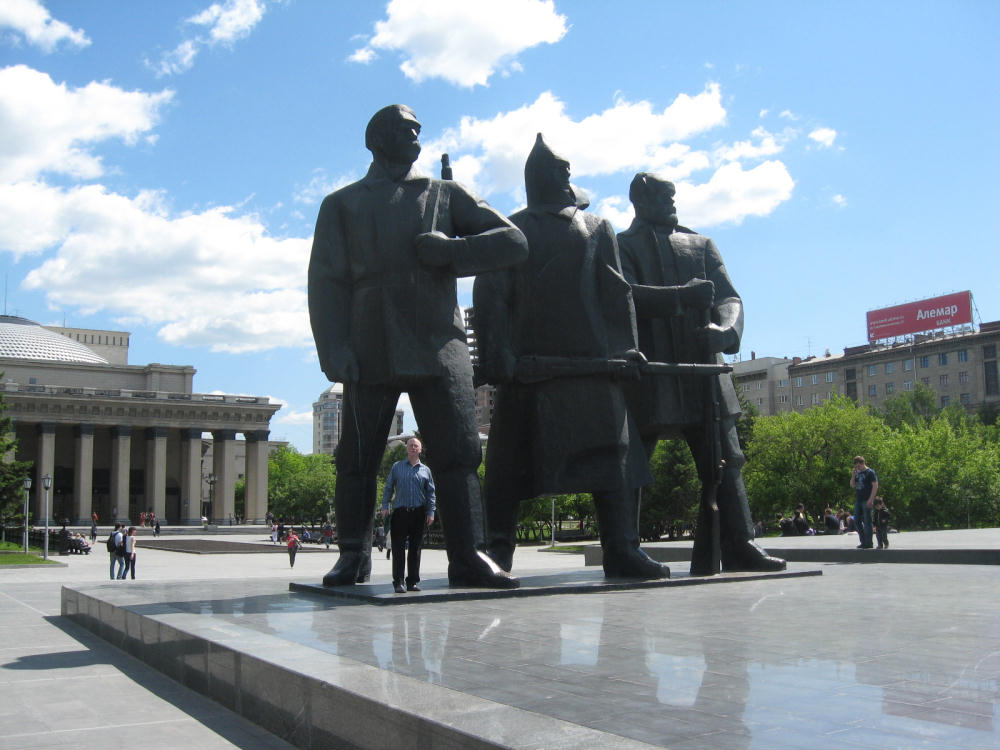
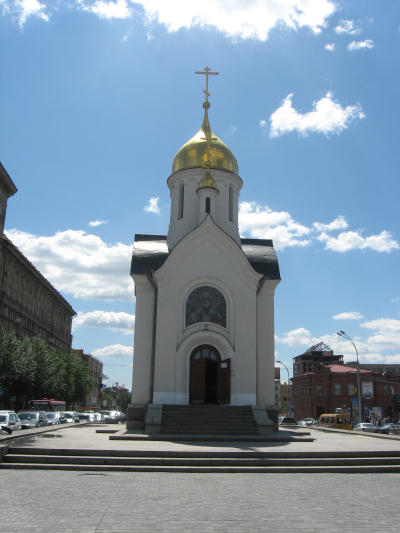
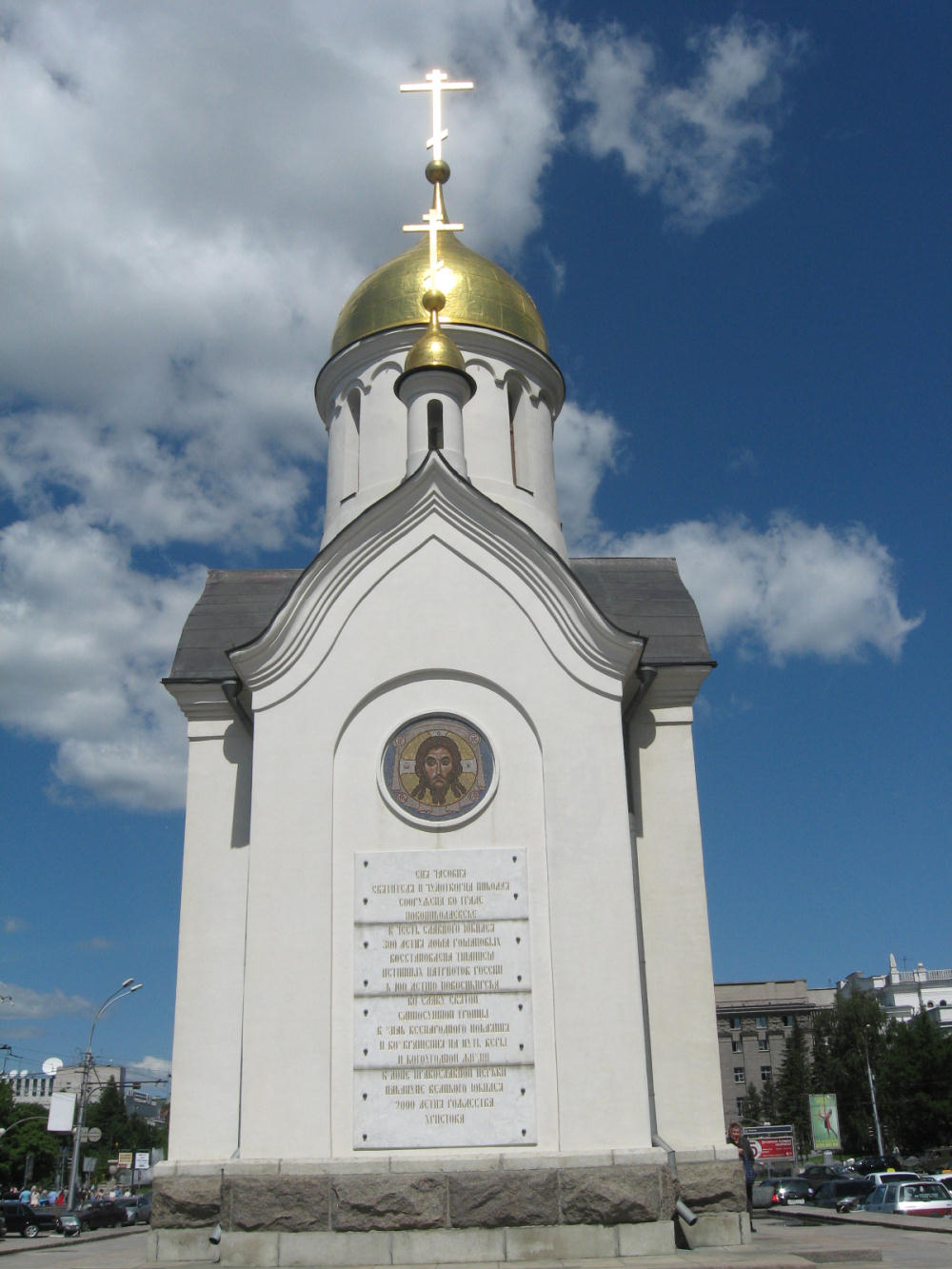
The chapel, also shown, is popular for weddings (traditionally on Fridays) and is considered to be the geographical centre of Russia. Note, this is the centre of Russia, not the centre of Siberia. Given that this is nowhere near Moscow, or indeed nowhere near any part of western Russia, this really demonstrates the enormous expanse of land that is Russia. Given that most of the urban population is white, I am beginning to understand the Russian assertion that Europe is one landmass, running from Portugal to Vladivostok. Certainly, Russian culture is similar here to that in the west and is predominant in all Siberian cities.
Both of these pictures were taken by a colleague who has passed me her flashka to transfer to my computer. None of the people I know, who happily pass round their 'flashki' (memory sticks / flash drives), ever seem to avoid having a virus.
On my return, I went to a colleague's house to drink beer. Only the people who have actually been to Britain realise that bitter is a truly different item from their own potations. But there are some quite good beers in Russia. To satisfy local custom, I drank my beer with marinaded salmon and smoked tuna. They don't go with this British notion of drinking beer by itself.
My guests told me with some disgust that their mayor was corrupt. They recognised my satisfaction, however, when they told me that he was to go to prison. This is the way to go.
The taxi driver who returned me to my house makes me look like a provincial. He had been to the American west, to Canada and to Peru. It turned out that this was through having worked on a Vladivostok fishing trawler.
Returning home: My employer came round with a television recently. My colleagues apparently feel that I am living an impossible life without one. As it is, I rarely watch in Britain and refused to pay for a licence in the last few months of my time at home. I'm not sure I really need one here, as Russian television is mainly violence and is in Russian. The news I can read on the internet. Anyway, my employer was also bothered that my door messaging service wasn't working. It doesn't bother me, I said; yes, but we may need to get hold of you. Anyway, the reason for the deficit soon became clear. My flat is on the bill of shame every month for non-payment of bills. The landlady, who gets repair-free rent in exchange for paying the bills doesn't actually pay any. (The only time I ever saw her, she wanted some money from me immediately, not even a hello first. Raskolnikov's feeling of freedom to kill his landlady in Crime and Punishment now becomes clearer to me.) My employer now intends to pay the bills herself, deducting the bills from the rent. Looks like people will be able to bother me again.
The holes in the middle of the main road were laid with tarmac this weekend. It could be spurred by a lethal crash involving a mashchrutka (minibus used as public transport). In my opinion, it's not the holes which are dangerous but the manoeuvres of the drivers to avoid them. I often have to dodge cars which are using the pedestrian area as an inside lane of the main road. Also, although the minibus drivers are supposed to have taken two tests, as with UK bus drivers, it doesn't show. Having said that, their first test is a joke: Elena passed it, but is unable to drive on her own on a British road. (Sorry, Elena, but it's true.) Maschrutka drivers are notoriously bad drivers. Which reminds me: the journey by minibus to Novosibirsk, about 70 kilometers, was an overheated nightmare, beset by traffic jams and people driving without considering their likely contribution to the accident statistics. I do not understand why people do not use the train, which is apparently cheaper.
This morning, I visited my colleague's husband's business making office furniture. It is housed in what is essentially a single-storey semi-detached building, no bigger than a bungalow. There are two departments, the first measuring, cutting and finishing each piece of hardboard (each with a laminated surface), the second putting it all together. There is some modern equipment, including a machine for putting the smooth laminate edge on the side of the wooden components. As well as paying for the employees (about 7, I would say), he pays a massive 50,000 roubles (one thousand pounds) per month for the buildings. One thing I don't understand about renting in Russia is that the people who take the money never think it reasonable to maintain the property. The factory walls look like they were pointed shortly after the revolution. Similarly, my landlady considers a safe electricity supply to be some form of political correctness gone mad. (In her case, I rather think that some Dostoevskian characters would not bother to consider the life of Napoleon or Nietzche's ideas of the superman before deciding that her wretched life wasn't worth preserving.)
Then off I go to a new-style supermarket to get the sausage. New supermarkets in Russia have lockers for any bags you're carrying. So you go around the store toting the key to the locker. Only I went and lost it; I don't know how. I appealed to the security guard who broke in with a penknife. And refused to take any money. Russia surely has changed.
Russians still have a rather fusty image of Brits, however. My colleagues found in their visit to England that we are not as reserved as they had thought. The scales have fallen from their eyes. Apparently, the average Russian thinks that we are like Sherlock Holmes! Yes, including the fog.
Although misconceptions aren't only amongst the Russians. Whenever I get emails from Americans, they are always glad that they are not where I am, out in the subzero temperatures. No.. It's been 29 degrees Celsius recently (84.2 degrees Fahrenheit); it's the summer and by all accounts it's going to get warmer. And before we get too convinced that it's just the big countries, a friend in western Europe expressed surprise that I had heard of the death of Peter Townshend (not the Who guitarist, but the sociologist, perhaps one of the most famous outside of that august firm of Marx, Weber and Durkheim). Of course, I was sitting by the side of a fire when an elderly shaman woke me from my vodka-driven sleep to tell me that the smoke messages from the west told me that a well known foreign sage had gone to meet his ancestors. Come on! We've got the internet here.
A couple more things about Berdsk. I recently mentioned visiting a small furniture factory. It would appear that Berdsk specialises in this. The factory I visited exports its hardboard cabinets all over Siberia. There are several other furniture stores, including a specialist in wickerwork items which markets internationally.
Now the summer has come, many families are working in the gardens of their dachas (country cottages), sorting out vegetables. (Don't ask me if they're planting or harvesting; I wouldn't have a clue.) Meanwhile, now the main road has been mended, motorists in the evenings treat Ulitsa Lenina (Lenin Street) like a race track. Cars on either side of the road are challenging each other to speed duels, with the effect of turning a pretty ordinary looking town road into a dual carriageway without any protective fencing. No wonder a colleague of mine continues to decline her husband's requests for her to learn to drive (so he can do the drinking).
The Russian police take the drugs laws seriously, although research current indicates that a blanket intolerance to hard drugs and also to soft drugs such as marijuana is not doing the country much good. Closer to home, I found a syringe on the steps leading down from my floor at the top of our building. I am of course glad that we are doing our best to shoulder the nation's social problems.
The landing on my floor is a popular hangout. Of a weekend, one of the other residents sits for hours smoking on an armchair thrown out by another resident (I also have a couple of spare doors resting on the wall opposite my flat). Russian cigarettes have a particularly acrid smell, so one normally holds one's breath while passing between the flat and the lift.
Still on the subject of habits, I read that Russia is going to close down the nation's casinos in favour of a few gambling areas in different parts of the country. So much for the gambling shack on Ulitsa Lenina, unless they make Berdsk one of these wonderlands.
Each day In the mornings, I get to hold four classes, teaching children according to their age groups. As well as being called Mr Smile, I'm also called Action Man and Superman. Apparently, the children consider me to be very active in the classroom. Unfortunately, having rewritten an entire play on Thursday evening because of logistics problems, Superman hit kryptonite on Friday afternoon. There are now several photographs doing the rounds of a teacher sleeping with his head on the staffroom table.
Still, there have been some lively times earlier in the week. On one afternoon, we got to visit what purported to be a museum of sun worship. It is possible that some of the artefacts were genuine, but most were either reproductions or made by enthusiastic adults and children. This was made clear. Things became murkier when - according to my interpreter - somebody calling herself an archaeologist started talking about the harmony created by these works of art. I quite enjoyed the playing of various metal bars, which was quite atmospheric, although a colleague suggested that the headband-adorned instrumentalist had been to India and had smoked too much. Things reached their nadir, however, when we reached a room in which were posted various photographs purporting to represent mystical happenings. These tended to look like blobs and were of very poor quality. Some were obvious. I realised that I was in the house of the Thumb God.
More impressive was an archaeological museum devoted to ancient Siberia. Like the sun worshipping institution, this was in Akademgorodok, the huge academic town cum research establishment in the southern suburbs of Novosibirsk. The museum was very small, but the things it contains are priceless. Mummies which a colleague tells me are better preserved than those in ancient Egypt. You could see the skin on the individuals' arms, including their tattoos. Huge animal skin coats, large enough to act as a shelter for people on the move. The clothes found beside the mummified people. Apparently, the climatic conditions meant that there were only two times in the year in which a body could be buried. Also, a mammoth's skull and various weapons and other tools, the local scientists engage in a practice found in the west, of reproducing equipment using only the resources and apparatus used at the time and in that place. Fascinating.


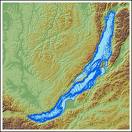
I can't say, to be honest, that there is sufficient to see and do to make it worth a visit unless you're already in Asia doing other things.
I went byCat train, although the type of train one uses determines the level of luxury. Although a little better maintained than the Moscow-Elets flyer, our train was still pretty low-level compared to the actual transiberian itself, which I gather is rather expensive.
On our return, the maschrutka (route thingy - essentially, a minibus used as a public service vehicle) found itself in a huge traffic jam on the one road linking Novosibirsk to Berdsk. As well as enjoying the view from the rear of being tailgated by lunatics fighting their way to the next traffic jam, we were also almost choked by the dust as our driver and others took their turn in stirring up the dust on the service lane. As we went, we saw a variety of cars, parked or otherwise, with gaping dents; of course, this has nothing to do with the drivers' lane discipline..
Anyway, I'm back in a humid, midge-ridden Berdsk. To entertain Ferrers, water tower fan and host of the famous Pork Pie blog, I attach a picture of the water tower near Berdsk railway station.
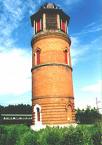
water tower at Berdsk
Miscellaneous: Last time I saw some teenagers in a classroom, the majority believed that the Americans never did reach the moon. Later, I asked one of my adult classes; there, all but one did not subscribe to the conspiracy theory. Moving outside the classroom, The latest variant on the motorised mayhem that is the town square at night on weekends is to make the car tyres screech by accelerating from a standing start. In terms of noise, it works well. I visited the old-fashioned supermarket. Grendel's mother gave me her usual greeting, a look intended to freeze my very soul.
It's quiet here, although I've been busy during my holiday. A new institute in Moscow is planning to have a Russian version of the Careersteer careers test, so I've been experimenting with Russian job titles in the database, and web site fonts etc. Since the days when career choice was largely affected by a limited labour market, prospects have widened somewhat, and graduates are no longer working in beer kiosks. Although I gather that the recession is reversing the trend somewhat.
A biologist, my friend is less than impressed with physicists as a herd. As the latter tend to deal with precisely defined parameters, they have a tendency to see the universe as a relatively simple place (in his opinion), and the quest for a Grand Unifying Theory (GUT) is a common piece of arrogance. Either they've got it wrong, says my friend, or the theories are so all-encompassing as to be useless (in my opinion, the wider conceptions are just new ways of describing phenomena rather than explaining them).
During our discussion, we were joined by a Russian physicist. He fairly quickly went the way my friend predicted. Because the core element, hydrogen, is now well understood, therefore the universe is a simple place and therefore we will eventually be able to x, y and z. Also, said our friend, the missing bits of our knowledge can all be explained in terms of religion. Essentially, our acquaintance was building his own GUT, but with religion as the glue to keep it coherent.
The Russian also considered the Big Bang to be a given. My friend and I have similar criticisms of this. This isn't to say that the theory is definitely wrong, but the evidence is not conclusive. For all the talk of accurate measurements and mathematical proofs, in my estimation, the starting place of the measurements are not really well known and therefore any measure, however reliable, is unlikely to be valid. My friend's take on this is that the theory is built of assumptions built on assumptions built upon assumptions. Pretty similar criticisms, I think. (The biggest argument in its favour is the Doppler Effect, but, as my friend points out, we don't know if this is just a phase in history, with a universe able to contract as well as to expand.)
After the Russian went away, we turned to evolution. In my friend's estimation, his colleague Richard Dawkins is pursuing a crusade in pursuit of his own GUT, evolution. In doing so, he may well be misinterpreting some aspects of evolution, stretching his idea of little incremental changes to incredulity. Apparently, one criticism made by the Christian fundamentalists is valid: how does his way of looking at things explain the 'in-between' stages? Would a gradual lengthening in giraffe's necks make much difference to individuals' survival (remembering that the central feature of survival of a species is reproduction)?
In fact, the ability to change drastically is available to species. Within the DNA is a range of different possibilities. All sorts of jumps, not all of them adaptive, are possible. Which brings us to DNA and genomes and their misrepresentation. In the press, a particular way of thinking is prevalent, that genes are essentially representative of different features. Apparently, this is not the case, as most of the structures are regulatory rather than attributes, with a complex feedback system. So many of the claims made of DNA are not at all accurate.
My friend also discussed this 'strange country', Russia. He noted in particular a dual psychological aspect in many Russians. They can be exceedingly logical and yet hold in their heads some quite eccentric, often contradictory ideas. Like our physicist who considered religion to be part and parcel of his theories, they dabble in religion, mysticism and all manner of nationalist and racial theories.
When our Russian acquaintance joined us, we were talking about how Russia was becoming polluted on an almost all-pervasive scale, so much that you almost stop noticing. My friend did cite the littering of English towns and cities, at which point the Russian told us that of course it was all because of the non-white people infesting the country. (My friend was definitely of the opinion that white people were the primary culprits.)
Russian racial theorising is a most peculiar thing, given the asiatic nature of Russia, and also given the destruction wrought by the racially obsessed Nazis. But then they also want strong leadership, when its prime exponent, Stalin, killed even more of them than Hitler.
My friend felt that while the towns you visit look like just another part of Europe, the people are very different. Often wonderful, but definitely different. Another thing that he has noticed in his brief visits here is the Russian approach to planning. They may decide on something quite momentous and potentially doable. They say 'everything will be all right' - how I hate those words - and then get out the vodka and, come the morrow, all is forgotten.
More to the point is life's little inconveniences. It occurs quite frequently that we get notice that all the water will be shut off for a weekend. Other times, the water will be shut off for shorter periods without notice. Other times, we get notice that, say, the cold water will be shut off, only to find that both hot and cold are off. And then there's the occasional power cut, unannounced, a day or so after a thunderstorm; what's that all about?
Well, this Monday starts something familiar to everybody who has stayed over in a Russian summer. The hot water is turned off for two weeks. This is some form of maintenance. Maybe they're lime-scaling, like a kettle. In bigger cities, this occurs in sectors so you can go and have a luxurious wash at a friend's on the other side of town. Berdsk, however, is a small place, so it's all coming out. Still, on hot summer days, it is easier to brave a cold shower with some semblance of enjoyment than if it were to happen in the winter.
I'm currently working on a Russian adaptation of CareerSteer my free careers test for helping people. Never has career choice been covered so well in the Russian arena. Moscow likes it, at least one institute does, so let's hope they can get the government interested.
Meanwhile, my adults are drifting back to class. The adolescents don't return until September. Various members of staff and their husbands are threatening to sit in on my classes, ranging at different levels, so it should be an interesting term.
Next item: it's about time I showed some pictures of Elets. Beautiful place.
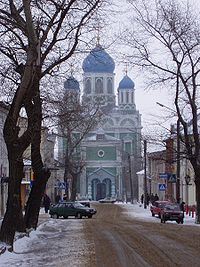
Elets itself was demolished three times, by the Mongols, by Timur (aka Tamerlane, a putative descendant of Genghis Khan) and by the Tatars. Being situated on the borders of southern Russia made it a likely target. See below the three soldiers, which may be familiar to you from my photos of Novosibirsk, but instead of those huge monuments, these metal men representing different ages of warriors are life size.
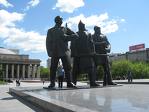
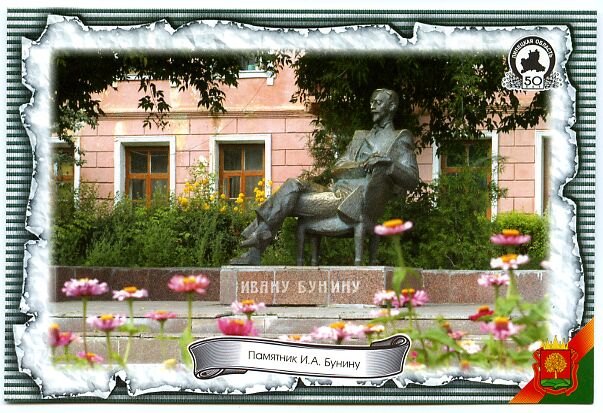
Above is Elets' most famous son, the writer Ivan Bunin. Can't say I'm a great fan, even if he did win the Nobel prize for literature in 1933. Perhaps it's professional rivalry. A couple of short stories I'd forgotten about have been kept by the Bunin State University of Elets and are due to be published in a collection of local writings later in the year. Yea, a published man of letters. (Still working on getting my statistics book published, but that's life.) I'm pleased to say that another of my creations, CareerSteer, has aroused the interest of a new institute in Moscow, so we're hoping it might be taken up by the government. We'll see.

A spate of serious car crashes across Russia has killed more than 100 people in one week - leading the government to blame "systemic" road problems. Interior Minister Rashid Nurgaliev blamed criminal negligence and a road culture lacking basic driving skills. He admitted Russian roads are bad, infrastructure is weak and drivers often chat on their mobile phones at high speed or drive while drunk.
Over 10,000 people died on Russian roads in 2009 - Europe's highest toll. In the last week a drunk driver in Perm hit a pregnant woman and child in a car-park, killing them both. In Novosibirsk, central Russia, a passenger bus overturned, killing eight and injuring 30. [Yes, this is the way I've travelled to and from Novosibirsk, hating every minute, I'm 100% catching the train when I have something to do with the planning of one of these excursions.] Day of mourning Police are investigating reports that the driver was either asleep or on his mobile phone.
Meanwhile a day of mourning was declared in Rostov after a bus hit a tanker killing 21 people.
The Russian government has made earnest attempts to combat bad driving - including employing legions of traffic police with stop and search powers. [I have noticed some of these at work, catching up with the most flagrant breachers of lane discipline on the big and only road from Berdsk to Akademgorodok on the outskirts of Novosibirsk.] But Mr Nurgaliev admitted most drivers in Russia still think they can break the law and get away with it.
Story from BBC NEWS: http://news.bbc.co.uk/go/pr/fr/-/2/hi/europe/8180405.stm
Published: 2009/08/02 13:14:55 GMT © BBC MMIX
In the meantime, I'm about to look for a new flat. I've had enough of some neighbour hammering away at the wall / wood / anything he can get his hands on at about two o'clock in the morning. My complaints haven't changed anything and my sleep patterns are worse than their usual ropy selves. So, things may improve rather next month, new flat and, who knows, maybe I'll get paid too.
The traffic situation is interesting. There is now a frequent police presence in the centre of town, so people often drive with considerable thought. Unfortunately, there is some sort of backlash in their absence. As well as the usual crunches between consenting motorists, I saw an incident involving a pedestrian last week. A lady with a shopping bag was crossing the zebra crossing in the middle of town. A car duly stopped for her and she continued to cross the road. Another car came up behind the first car and decided to overtake in order to continue on its way - straight towards the woman. Fortunately, he braked enough to stop lethal contact, but he still bowled her over like a skittle. A young lady and I helped the lady to the side of the road and sat her down. She was able to move the leg that she had hurt and later joined a friend on their way to more shops. The young man in the offending car did get out of his car and looked serious about the matter, so it was hard to be angry with him. Who knows, he might even start to drive with a little more consideration in future. But one can see just how dangerous the driving really is in this country.
Another unrelated thing: I found Irn Bru (Iron Brew), Scotland's answer to Coca-cola, on sale in a supermarket in Berdsk. See you, Jimmeh! (It's a truly horrible drink, by the way).
Meanwhile, I went to the dentist yesterday. Although this was in a private clinic, I had a thorough drilling and preparation for root treatment, including preparatory x-rays, all for fifty pounds. Today, I'm going in to have something passed through my root canal. Looks very tiny, perhaps it's nanotechnology. I'm told that this time it won't be painful. However, the most impressive thing I saw yesterday was the dentist's affinity to her mobile phone. This was on at all times during our rather harrowing session. When I say impressive, I mean that it made quite an impression on me. As it would if you were given an injection in the mouth by somebody talking to a phone tucked under her ear. I mentioned this to the dental nurse, who considered it all quite normal. Coming next: heart surgery while playing snooker.
Find here an image of Barnaul old town:
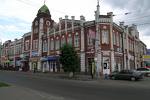
An interesting billboard announced Narcomania, with lots of smiling young faces. Now this is not a new film but the Russian word for drug addiction. What I think I was seeing was a change in strategy by the Russian government. Their research has indicated that a zero tolerance approach (lock 'em up, send 'em somewhere else) has not worked, so now they are intending to be more supportive, presumably concentrating on rehabilitation and education.
I saw two Lenins. Neither had him showing off by casting his hand over the city. At least had him wearing a coat, however. I was pleased about this, as the weather was a bit raw in the mornings.
Back home, the lift still isn't working. It's almost two months now.
The weather is getting cooler here, but the afternoons still provide pleasant walking weather. Not much else to report. A whole gang of overalled guys looked at the lift on Friday, but it still keeps silent counsel, unmoved by all the attention and unmoving.
Anyway, in order to get away from the huddled masses, I went up to Akademgorodok, that once cutting-edge military research establishment (still very much at the forefront of artificial intelligence computing). While waiting with some students, I noticed some pillboxes. Surely they weren't expecting Hitler to get this far any time soon? No, but the Americans were considered potential enemies, especially given Akademgorodok's former reputation.
After meeting up with a range of university students, ex-students and others, some of us retired to a rather upmarket cafe above the local department store. And very nice food they have too. All Russian stuff of course. Then I walked a friend home to her flat and was invited in for tea and chicken roll and tea and biscuits and tea and.. tea. Anyway, her parents were there; they seemed fairly ordinary, one being an accountant and the other having a job that seemed to involve a certain amount of driving about the big city, Novosibirsk. Their flat, however, was huge. I didn't see all of it, just the kitchen/diner, which was bigger than the average flat. Assuming that the whole family doesn't huddle into a boxroom for the night or get down on the kitchen floor - and the spacious corridor outside suggested not - then the flat must be enormous. With marble (or mock marble) walls and flooring.
Back in Berdsk it's more of the same. The lift got repaired a week or two ago, but the internet tends to get switched off at weekends. Apparently the connection is intimately connected with another lift in a neighbouring house; therefore, as that lift is now being repaired, the internet is switched off at weekends in order to isolate the electrics when the lift repairers are around. Let's just hope that they are bit better at fixing lifts than the last lot.
Yesterday, all the water (yes, hot and cold) was switched off without written notice and was still off when I went to work this afternoon. I had to wash in the toilet at work, a toilet which is shared with dozens of other offices and smells to high heavens. In fact, I'm beginning to wonder if I might not have smelled sweeter if I hadn't bothered to have a wash. The water's on again now, although I'm returning to the traditional Russian habit of keeping a large bowl filled with water in case of the next unexpected shortage.
We're starting to get sub-zero temperatures and snow here in Novosibirsk Oblast. Although it generally isn't too bad, I decided to put on a proper coat rather than a light jacket when the town hall clock showed a temperature of minus 10. The snow ploughs are out and the maschrutki (privately owned minibuses operating the local bus routes) are behaving as if the weather hasn't changed since the summer. Racing along, breaking hard at stops, careering round corners; they're taking our lives in their hands. I'm told, incidentally, that these minibuses were not designed for carrying human cargo and are quite dangerous when used as buses. This general situation isn't helped by people handing over their fares to the driver as he makes his way along the roads; everybody colludes in making accidents more likely.
Talking of collusion, some acquaintances were discussing the terrible pay amongst academic staff in spite of government money pouring into higher education. People would like to stop corruption but seem unwilling to speak out. This may reflect the political reality. When I first came to Russia in 2003 and 2004, people were happy to talk about the past and present. Now, with the exception of some young university types, discussions about the Soviet past are in fact silences girded by platitudes. And that silence means collusion with present as well as past practices.
The temperature was minus 14 but I was favoured by a lack of wind over the time I was at the monument on the edge of the central park beside Ploshad Gorkova, Gorki Square to the rest of us. (No, not Gorki Park; that's a huge place in Moscow.) The wind came up on the walk home and my toes and hands got to know about it. I withdrew my fingers within their gloves, balling them into my hands for warmth. Soon, I must buy some mittens. If the temperature drops further, I may also wear more in the way of socks.
The Russians' Victory Day was held in May, as previously written about in the blog. The British Remembrance Day has given me some repeat material for my lessons. People were interested and respectful, checking out the vocabulary ('age shall not weary them, nor the years condemn'). I was also able to wheel out probably the best thing that Stalin ever said, on the subject of the Second World War: "The Americans paid in money, the Russians paid in blood and the British kept the whole thing going." I guess that's good old British bloody-mindedness for you.
These days, I have a bowl of water sitting in the bath so that I can have a strip wash when required. This is very Russian. Other Russian habits include eating ice cream all year round. In the daytime, not only can you buy the stuff in a supermarket, but dedicated ice cream kiosks are open here in Berdsk, in minus temperatures. I ate a choc ice in minus 15 recently. Ok, but I still prefer it in the summer; I guess you can't take the Brit out of me that quickly.
I did a straw poll in a few classes of attitudes to caviar, known there as ikrah (emphasis on the second syllable). Everybody prefers red caviar, that rather fishier alternative to black, usually made from salmon or lumpfish or pike-perch. I think black ikrah may be eaten in the west more as a status symbol than anything else; I've always considered it to be rather salty, although I've never eaten the more expensive variants.
Most Russians may exercise thrift, but this does not extend to the environment. There is no recycling, although if you leave items outside the house, they will be picked by other people for re-use or resale. One of my students heard about protests against a third runway or whatever it is they're thinking of building at Heathrow and thinks Brits are the only people in Europe who worry about environmental problems. He's coming out with variations in the sun's rays when considering global warming and in common with many Russians is not at all perturbed by problems relating to waste or to the depletion of raw materials. In the latter case, it is because Russia has rather more than most, even if much of it is buried in the permafrost, although global warming and commodity prices are making these more accessible. The answer to most environmental questions is, 'Russia is a big country'.
Part of my enjoyment is leaving to one side the classroom and my noisy flat, getting on a marchrutka (minibus turned into public service bus) and walking through the wood to the university. I know that wandering through snowy woodland is not a uniquely Siberian experience, but it blows out the cobwebs and leaves me with a feeling of wonder. As the sun goes down, the slender trees are my companions amid a cottony backdrop. The path ahead of me is a gleaming white, a cinematic environment.
When I reach the university, I walk down a path between two white creatures, an upright dragon and a buddha, created out of snow by the students.
On Friday evening, I joined an English student of Russian who is here on an exchange and the Russian organiser mentioned earlier to plan a session of the Russian club based on British themes. The organiser, at my instigation, had previously introduced me to the psychology department where I had had a difficult time introducing my Russian version of CareerSteer. They had suggested a meeting first. I said that this would be a meeting about having a meeting and finally persuaded them to look at the web site. They understood what it was then and said that they would pass it to the Dean of psychology. In the subsequent Russian club meeting, my friend said, look, there's the Dean, do you want to meet her? and rushed down the stairs, with me limping in hot pursuit. It turned out that the Dean's colleagues had not passed her the information about my site so my friend saved the day. As so usual here, things get messed up in spite of all efforts to further them, but then good luck and kindness sort it out again.
A word of warning: don't buy bottles of Guinness if you happen to shop in Berdsk supermarkets. In spite of the labels claiming Dublin production, they contain Russian brown beer. It's potable, but isn't stout, let alone Guinness. At double the price of the local beer, somebody is enjoying a good mark-up.
As you will no doubt have noticed, there have been two major disasters in Russia recently. One, involving the use of fireworks in an overcrowded Perm night club, has an as yet unknown death toll. Somebody I know who used to live there and is quite upset about it all, tells me that the current number, 140, is strictly provisional as the health status of many people is described as critical. The shadow of corruption hangs over this affair, as a strict inspection regime exists but is seen to fail again and again.
My contact agrees with me about another health and safety problem, that of the marzhrutkas, converted minibuses that ply their trade in every urban area. As I've noted before, they handle money again and again in while driving. Those of us who try to hand over our money at bus stops are seen as a wee bit quaint and it is not unusual to see drivers making calculations while driving over the icy roads at top speed.
Not everything is down to negligence, however. I gather from a British contact that a BBC correspondent covering the fatal train derailment between Russia and St Petersburg was scorning Russian government claims of terrorism as a smokescreen against neglect. I think this unlikely. Whenever I travel by train, the wheels are checked at almost every major stop and I think the lines are also much better maintained than those in Britain. Russian trains have to cope with extremes of temperature throughout the year and the rail system is seen as of the greatest importance in this sprawling transcontinental empire. It is of course its multi-ethnic nature, with huge numbers of muslim citizens that made it likely that an extreme Islamic organisation would eventually claim responsibility for blowing up the line.
The fact remains that most of Russia is white and Christian Orthodox. One effect of this is that much of what westerners see on a map of Asia does not in fact look like it on the ground. Cities and towns such as Novosibirsk and Berdsk can be found in Europe and, if a person materialised in such a city without information, he or she would be hard pushed to know if the location was in the west or the east.
Orthodoxy, however, has an interesting effect on people. I was discussing accents with somebody I know. Britain has hundreds, some of them incomprehensible to most Britons. Russia has three variations. When I mentioned my theory that some of this was to do with the sheer modernity of Siberia, which was only settled over the last few hundred years (Novosibirsk only in the twentieth century) and he suggested that this was the effect of communist russification of education, my argument took me to a Britain where settlements had existed 'before Jesus Christ'. To which he said, 'how can this be? Jesus started it all'. Not even the most fervent C of E or Catholic English Christian would say this. As with most muslims, orthodoxy, at least as practised in Russia, is obscurantist. Whereas most muslims of all nations are encouraged to learn the Koran in Arabic, the language of the church is in Old Slavonic. In the case of both religions, adherents do not know anything of the history of their religion.
I will miss my companion, however. Just as I contributed to the English club, for the benefit of most Russians, he steadfastly maintained what was the Russian club and is now called the International Club, for the benefit of visitors to Novosibirsk. I keep him anonymous as the change of name was not incidental and represents his resistance to a rather niggardly attitude to foreigners by some members of the authorities. He is feeling a bit bereft at the moment, as I am not the only person currently heading for home. Swedes, Koreans, the only Englishwoman seen in these parts for many a year, are all going home.
I'll be in Belarus, in the city of Minsk. For obvious reasons, many insights into this country will not appear here. It ain't encouraged. I will merely say that there are mixed feelings. For every westerner who cries tyranny, there is a Russian or Belorussian (white Russian) who sees socialism as a means of protecting people from the upheavals of the last two decades in unequal Russia.
Meanwhile, I'm saying goodbye to Berdsk. Before settling myself down to another week's work, I went to the cinema. The billing said something about people's history but it turned out to be a version of Dickens' Christmas Carol (English literature is largely represented by Dickens and Arthur Conan Doyle in much of this country). This was a Disney film with the likes of Bob Hoskins amongst the cast. Scrooge was played by a man who varied in his facial expressions from that of Wilfrid Brambell's Albert Steptoe to that of Spike Milligan's Spike Milligan. It always annoys me when people like John Travolta and Bob Hoskins all seem to speak much better Russian than I do, I thought as I walked away from the cinema across Ploshad Gorkova (Gorky Square).
The square is full of cubes of ice, large and small, presumably to be turned into statues and possibly some architectural structures. Some hardy young children slide on trays down a specially constructed piste made of ice. The temperature is now minus 18 with a wind and I think temperatures are expected to stay low for many months. Which reminds me: any more outings of more than fifteen minutes will require two pairs of socks now. My toes were becoming rather numb during today's outings.
One of the joys of finishing a long tour of duty in another country is the giving away of books and other things which would be too heavy to be taken back. I was able to find good homes both for my computing books and various novels. Quite what the fans of English literature will make of R. K. Narayan and Iris Murdoch is anybody's guess.
My flight via Riga using Baltic Airways was uneventful. Having said that, the aeroplane's food had to be paid for and they only really wanted to deal in Latvian currency, in spite of having taken off from Gatwick. As I didn't want to use my credit cards in a comparatively insecure setting, I opted to tighten my belt. At Riga, we were rushed round to the connecting terminal at bewildering speed, and the snack bar was of course only taking Latvian money. The two different buses were only separated by the obligatory security check. Checks nowadays include a scanning of laptop computers; I thought that this was due given the obvious potential for embedding different types of mechanism inside a metal housing. Food wasn't available on the next flight, so I had a golden opportunity to get rid of some of those festive calories. The flight from Riga to Minsk, being only a short hop, didn't offer food, and even the tea required Latvian money. My impression of Baltic Airways as something of a no-frills job was reinforced by the plane, a Fokker 50 replete with propellers attached to each wing and ashtrays by each seat. This was, however, a no smoking aircraft, although given the state of one or two of the passengers, it wasn't a no drinking craft.
As I emerged from Minsk airport, I was besieged by taxi drivers. I demurred, saying that I was catching the bus into the centre. One particularly enterprising driver followed me, saying that he would take me to my destination at a bargain price of forty dollars. Having already done my research, I knew that the going price was twenty-five dollars, so I was beginning to go off this particular entrepreneur. My favourable impression deepened when he told me that the bus wouldn't come for another hour, which proved to be another lie. After a short wait in subzero temperatures (I would guess about minus ten Celsius), the bus came. My new friend approached the bus driver, no doubt to give him the impression that I was a difficult passenger.
This situation was made just that little bit more difficult by a piece of advice I had been given from two separate sources before I left the UK, that I didn't need to convert my Siberian savings into Belorussian roubles. According to the sages, people in Minsk would be willing to take dollars or my Russian roubles. This advice, however, had not been given to the bus driver, who of course wanted Belorussian roubles. (My taxi driver would have taken Russian roubles or pounds for sure, given the massive profit he would have made on me.) Fortunately, some helpful people on the bus explained to the driver that the five pound note that I was offering him was worth three times more than the fare he had demanded. One of my assistants also bought me a 'zheton', a token for the metro (worth 600 hundred Belorussian roubles, maybe about 13 pence). People here, if one exempts taxi drivers and officials, are really rather helpful.
After a brief wait when I emerged at the metro - Minsk has only two, intersecting, lines, with the zheton allowing a single journey of any distance within the network - I trudged for about ten minutes through the snow to my new accommodation. It was after ten o'clock in the evening when my morning meal of cereal and milk was supplemented by a truly Belarussian meal. I ate a salad of cabbage, mushrooms and sweetcorn, rissoles of unknown content, a glass of keffir (fermented milk, I think) and chunks of salted apple, a Belorussian speciality which is really rather tasty.
The next day, involving a search for accommodation, was another occasion for only eating breakfast and dinner. Linking up with estate agents and the like involves periods of waiting around - "don't move from where you are" - to then moving in a hurry across the city, without time to settle down for lunch or even a pie. The first day was rather wasted, as the realtors had ignored my specific request (mainly having the internet available, as I wish to conduct business online in addition to the part-time teaching I'm doing here). The following day, I took control and was given the details of a different letting agent. Although this did lead to success - a one bedroom flat in the city centre - I was once again without lunch.
Friday, three days after my arrival, was an occasion for using my new address to register my visa with the authorities. More "don't move until we tell you" and yes, no lunch. In the late afternoon, I was desperately searching for a Belorussian national bank in the locality of my flat which would sell me a voucher necessary for my visit to the OVIR, the registration office. As previously, I was rescued by a complete stranger in the street, who spoke fluent Russian and English (apparently not common in Minsk) and also had a thorough knowledge of the registration process.
The voucher being paid for, I met up with my landlord in the early evening and was driven to the OVIR. We were greeted by an official who sat with a fur wrapped around her shoulders, whose every action betrayed a desire not to be in the office that evening. I was told in no uncertain terms that my application was a day late. I explained that I had only entered Minsk in the late evening on Tuesday and that as this was only Friday, I had acted within three days. Unlike in Russia, however, where applicants have three clear working days after arrival to get their visas registered, it transpired that the day of arrival was deemed to be Day 1. We were given a bit of a question and answer session and had to pass my documents to the official twice - "passport!" - and were then given a rather difficult form to fill in, before finally being given the stamp of approval. Clearly, the 'back in the USSR' impression that Russians have of modern Belarus is not just a matter of nostalgia; an almost impenetrable administration goes with it. Although my landlord assures me that the system was far more difficult a few years ago..
After going off to observe a fellow Englishman conducting a couple of conversational classes, the two of us walked through the snow to find a cafe which served beer. As well as finally topping up breakfast with a bar meal, I tucked in to two tall glasses of a rather excellent black beer. With some regret, I negotiated the metro and reached my host house at five past twelve at night. Over the weekend, my hosts have been working, so I have been engaged in preparing my conversation classes for the coming week, a list of conversational topics for the next few weeks, and this blog.
As a centre for Soviet partisan fighting behind enemy lines, Minsk received 'hero city' status and was rebuilt on an heroic scale. The monumentalism is not to everybody's taste, however. I think the conversation went something like this:
"Comrade, do you know Buckingham Palace?"
"Of course, comrade. Where do you want it located?"
"Everywhere."
"Er, ok, anything else?"
"Yes, throw in a few parthenons just to show we've arrived."
"Oh, all right."
Just to show that they can do new too, here is the New National Library of Belarus in Minsk:
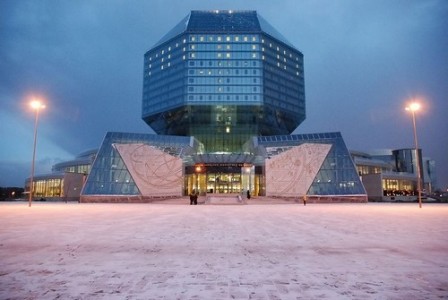
at which I am a member, with 'Certificated Specialist' status. Pretty cool for a bloke who just looks at the 'learn Russian' books.
Behind a big church there is a large graceful mini-town built around a square. The gleaming white of all of the buildings is the give-away: the 'old town' is in fact a post-war restoration. The only genuine pre-war part of Minsk centre is a thin sliver of buildings which reminds one most of a small French town.
Within walking distance is my flat, near a nondescript metro centre. This turns out to be on the edge of what was the Minsk ghetto. I recently taught at a school within the ghetto area. All of the area is now an estate of modern blocks of flats.
About 20,000 Jews were murdered in the first few months of the Nazi occupation. More tens of thousands were to be killed subsequently, before the surviving few thousand joined the final solution via the death camp at Sobibor.
Unlike Ukraine and Latvia, Belarus did not collaborate or sympathise with the Nazis. The Minsk ghetto is particularly known for its large scale resistance, with thousands of Jews escaping from the ghetto to join partisan groups, Jewish and non-Jewish, later cooperating with the Red Army.
The dreaded maschrutka - a private minibus used as a cross between a public service bus and a rehearsal for cross-country rallying - is only seen in the centre of the city if it is due to service the outer suburbs or the outlying villages. In addition to the metro, the city is provided for by quite modern single-decker buses, trolleybuses and some trams. As I live within walking distance of my administrative office, I would probably save money by using cash when I need to, but paying a mere nine pounds for a month's unlimited travel on bus, trolley and metro is irresistable.
I'm lucky to be living just a couple of minutes walk from a metro. My street is Maxima Tanka. Now yes, I thought that Maxim Tank was some iconic war machine that I somehow hadn't heard of on World at War. In fact, Wikipedia tells me that Maxim Tank was the nom de plume of a Belarusian poet and translator.
Which reminds me: the Belarusianising of post-Soviet Minsk does make life difficult for the newcomer. Metro stations have Russian names on some maps and signs and Belarusian ones on more recent signs. The main street has been renamed completely. Originally named after the first Belarusian printer and one of the first publishers in eastern Europe, Francysk Skarina, it is now Independence Street. As is usual, most locals use the old name, making life more difficult.
More difficult for me however is the proliferation of keys required to get into my building, originally designed as a block of flats for the elite but now split up into one room flatlets. First there's the electronic key fob to get into the house. At the fourth floor (third in Britspeak, as they don't use the term ground floor), by lift or stairs, I then need to jiggle one key a lot to get into the residential area away from the staircase and lift. Then to my half of the area, I need another key. Then I need two keys to get into my own flat. Must sit down and have a cup of tea.
As will be noted from the photos, there is a fair amount of snow about. The first image is the river Nyemiga, near the city centre, iced up. The locals are used to about three weeks of cold weather, by the way, but this spell of several months is unusual in this country. belarus_minsk_balcony_winter.jpg
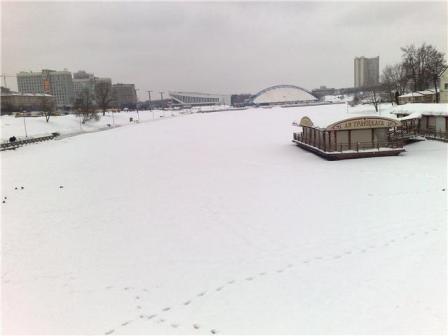
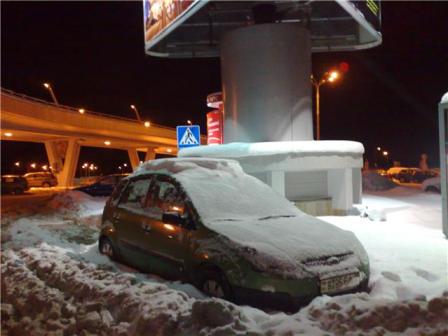
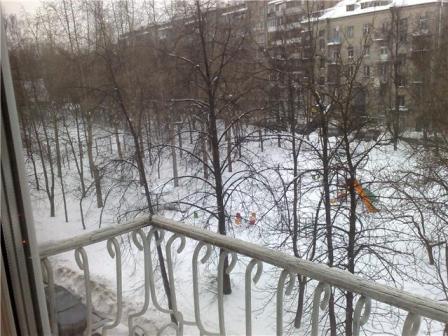
In short, there are some strange mental currents swirling around, heading from west to east and often back again. A bit like Professor Dawkins' memes, I suppose. I find it very disturbing. Whereas contemporary debates and disagreements about race, religion, etc have often been based upon historical interpretations, statistics or differing views of assimilation, we currently seem to be beset by viral perceptions with little logical basis. In Siberia, I also had people telling me about English comments about no longer living in a white country. I hope I'm wrong, but I rather think that Hitlerite pseudoarguments can arise from this sort of thing. Oh dear, I think I'm getting pessimistic.
On the optimistic side, last week I visited Minsk's Museum of the Great Patriotic War (1941-1945 - I know this is divisive from a western point of view, but then 1939-1945 is misleading from an Ethiopian or Chinese [or Spanish?] perspective). Most of this was devoted to the Soviet war effort and more specifically the Belarusian contribution. Belarus lost about 30% of its people and had 70% of its towns and villages destroyed (Minsk itself has few prewar buildings), partly because of its genuinely impressive contribution to the war effort (including Jews who escaped from the Minsk ghetto to fight as partisans) and partly because the country was dedicated to the Mein Kampf idea of an agrarian expansion of Germany with all the 'clearance' that that implied.
The western contribution merely consists of a diagram of the Normandy invasion tucked away in the victory story part of the museum and a picture of 'Anglo-American' troops coming off the landing boats onto the beach.
Some of the museum is spectacular. A German tank emerges through one of the walls.
There is a small room in the museum which treats of atrocities to civilians. There are a limited number of exhibits, most of them photographs, but they are chosen with devastating effect. Some of it pertains to Belarusians' sufferings. A young blonde woman, presumably part of the resistance, is shown in before and after mode, being hanged in public. An elderly couple are seen opposite each other, hanging from what is presumably their own living room. A German soldier laughs heartily as another victim hangs from a tree. Other photographs show Jews behind stockades awaiting their fate. One photo shows bodies lying together on a wooden floor, so emaciated that they look like plastic homunculi.
I get to my point: School children are regular visitors to the museum. I saw several such visitations during my few hours there. The room of terror, including and especially the section that treats of Jewish suffering, is given particular attention by teachers, and young people here learn a considerable amount about this aspect of the war.
In general, I notice rather a different attitude in Belarus to the nationalism I found in most Russian young people (who I still think of with affection by the way). In Belarus, patriotism is there. They try to foster their dying language and look at Belarusian history as such, but their patriotism is infused with an understanding of history and a keen interest in political developments in the west. Most also seem liberal in their views on race. I've seen people from Africa and Asia on the streets. My discussion with a Nigerian medical student (it is cheaper to study here than in Russia) confirmed my view of this. He generally considered the people to be rather reasonable in their attitudes and had had very little concerns over his time here. Room for optimism here.
On to the second visit. This was a manager coming to observe one of my cover classes. Having had some excellent classes, this was of course a bit of a mess. Only three people came - it is Military/Men's Day (this is synonymous because Belarus, like Russian, has national service) - and one of them was in a difficult mood, chewing gum, answering questions monosyllabically and generally being a lout. My organisation was rather challenged by all this and I gather from subsequent discussion that I need to adjust my teaching methods more generally.
Whereas Russians like grammatically based lessons, where I graft discussions around this core, Belarusians are used to having more group-oriented discussion sessions, with grammar as the add-on. From my observations, and from the comments of one of my Russian colleagues, this has both advantages and disadvantages. The students are far more fluent in their conversations in English than their Russian contemporaries, but also tend to make egregrious grammatical errors with abandon.
Tired from this rather difficult evening session, I headed for home, looking forward to settling down to tea, a read and bed. This gradually changed with what turned out to be the third visit. A portly gentleman with a swarthy complexion was struggling to get into the house. I asked him to wait and used my key fob to get in. "My brother lives here", he said. "Oh good" I say. My heart sank when he pressed the lift button for my floor and then he insisted on my visiting his brother. I find myself at table with four Armenians, three men and their 'big sister', a woman with her hair dyed bright red. I was chu-chued into having a bowl of what turned out to be fish-head soup, my least favourite. Then down went three glasses of vodka mixed with red berry tea.
(Russian) "What do you think of that?"
(English) "Rotgut."
(Russian) "It was made by Svetlana."
(English) "She ought to be ashamed of herself."
And eventually to sleep before my landlord turned up early the next morning to help with my visa extension.
When I say help, this was a recovery job. Fortunately, the OVIR, the internal administration department were in a mood to extend my visa. Less fortunate was granting it for a month less than my contract with the landlord of my flat. It turned out that my landlady had intended the end of July but had drawn up a contract for the 31/06. As I didn't want to assume that this might mean an end of contract that would never come - there being no June 31st in any year, we had to reapply. Fortunately, I found that the OVIR had also put 31/06 on my visa. Therein lay my salvation. As has been previously noted, the OVIR care not for the applicant's personal inconvenience. They would almost certainly have told us to go away in the normal run of things. In this case, however, the embarrassment of having themselves endorsed a daft visa extension means that they have undertaken to sort mine out properly. Hurrah for bureaucracy! Postscript: I've just had a phone call to tell me that my visa extension has now been successfully completed.
Also, as my current employers are becoming increasingly unreliable (e.g. booking me for four days work and then cancelling the evening beforehand), I'm looking for another employer.
Anyway, a few miscellaneous comments to be getting on with.
Although I have been critical of Minsk's monumental architecture, I would like to say something nice about their statuary. Generally in metal, many of the city's statues are life-size and rather pleasant. Examples include the three-figure folk music group not far from Nyemiga metro and the man with a mustache standing next to his bicycle near the cinema at Akadem Nayuk.
Here are a couple of others.
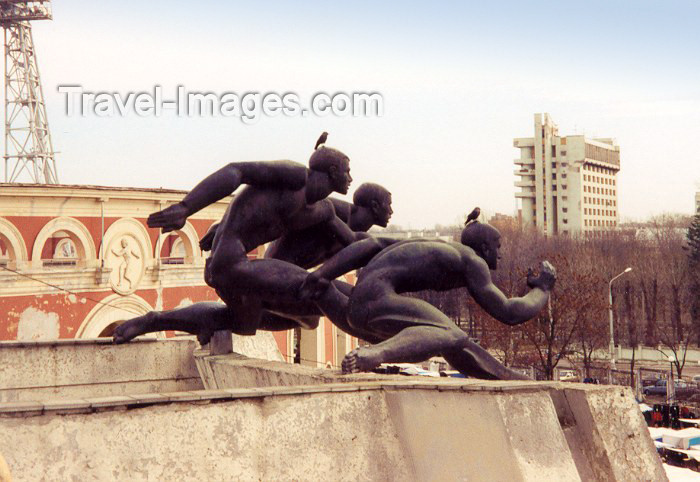
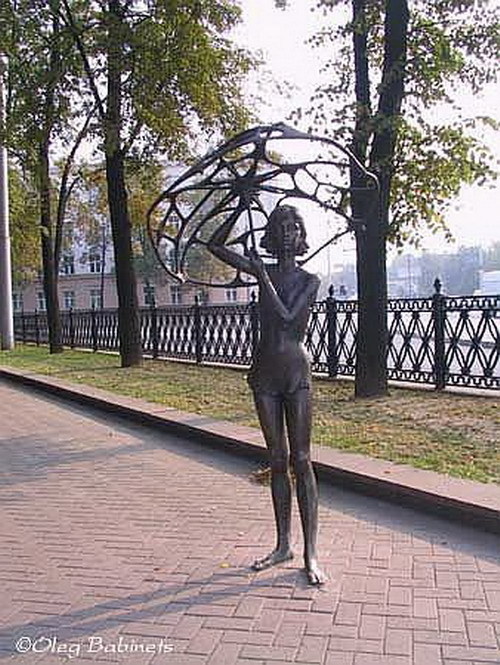
More sinister, however, is the statuary on the side of the staircase leading down to the genocide monument on Melnakaite.
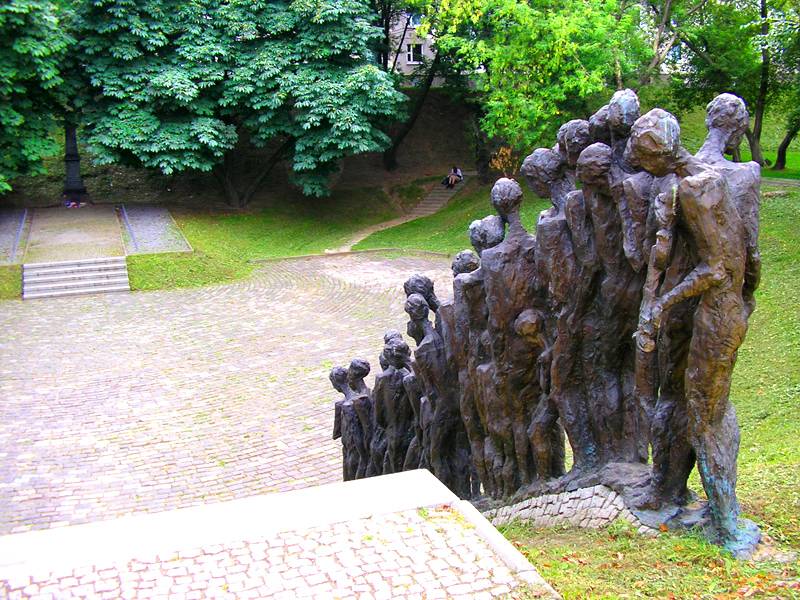
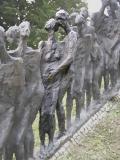
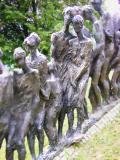
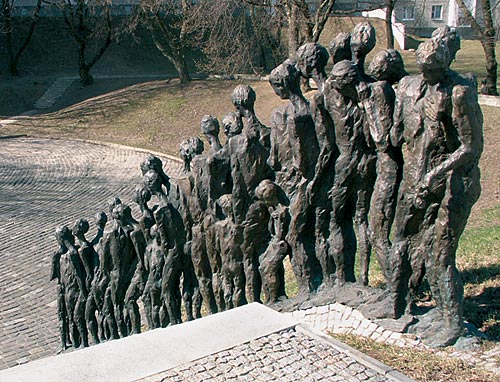
These are naked adults and children walking down steps in the nearby ghetto to be shot.
Which reminds me: a couple of days ago I saw a couple of young gentlemen with crew-cuts on the metro. One wearing a singlet, had a swastika tattoo on his muscular right shoulder. When he put on his leather jacket, I thought that he would just wait to get off at the next stop. However, he and his friend moved towards the centre of the carriage, where a young Asian man was sitting quietly amongst a group of Belarusian girls. The two men stood over him, staring at him; he looked up at them. I moved along the overhead rail and faced them: "Nyet", I said. They moved away towards to exit, waiting to get off at the next stop, muttering something in English about what football team I supported. I'm assuming it was a case of the game 'scissors, hammer, stone': ah, Brits, they beat Nazis, we'd better surrender now. My students, rather surprised at my recklessness, tell me that it was Hitler's birthday, so no doubt they were thinking of celebrating in the way of some Moscow and St Petersburg thugs, by beating somebody in public.
As I have said, however, most the Belarusians I've met have been tolerant people, who view this quality as one of their country's strong points and one of their few differences from (some) Russians. There are many more progressive trends in this country. Again unlike their giant neighbour, many people do consider the environment. Cycling is apparently becoming an in-thing in Minsk (although many people have cars, causing a fair amount of congestion). Also, a taxi driver I know uses propane to power his vehicle. Apparently it is considerably cheaper than petrol or diesel, emittng fewer toxins. Presumably the government is encouraging its usage.
One thing that Belarusians generally pride themselves on - sometimes with a feeling of ambiguity - is their tolerance. They generally are tolerant, although sometimes making the sensible point that they have only small numbers of ethnic minority people here. There is a vociferous minority, however. One of my students thinks that racial intolerance is a good thing, for the preservation of indigenous cultures in his opinion. Shortly after meeting a couple of neonazis on the metro, I met some adherents of 'White Power' on the steps above Nyemega metro stations. This I think demonstrates the links between racist groups in the west and eastern Europe. I gave them a piece of my mind before going off with a local journalist who considered them mad.
Most people here are considerably more relaxed about homosexuality than elsewhere. (In Russia, it is considered by many to be a lifestyle choice, adopted in places such as Moscow and St Petersburg.) They see it as natural and have friends who are not heterosexual.
Moving away from matters of tolerance, one of my seminars related to giving, particularly to charities. Charities are far and few in the east. One thing that came out of this seminar was that many people in Belarus have the notion that all westerners are well-off and that all Belorusians are poor. The fact that Minsk is swarming with lunatics driving BMWs at an alarming rate and the obvious unlikelihood of a plutocrat nation out there in the UK does not seem to dent this logic. This comes out in Belarusian attitudes to foreigners, amongst employers and many others. We are there to be skinned financially, as customers or employees, with scant consideration of our circumstances (e.g. an English teacher is not rich and, as foreigners are only offered accommodation at a higher rate - because we're all rich - then in fact we have less to spend than most locals, who often live with their families or in cheaper accommodation). Even when you mention the recession, it is seen through their eyes. "We're having a recession, too." Well, no, they're not. They may be a lower income country, but their government protects them from many of the vicissitudes of the market. They are often a touch sorry for themselves, much as I like them and their sense of humour. (These are half-way between Poles and Russians, in temperament and language, Belorusian being the alternative language to Russian, spoken in the country but also in intellectual debate, I believe.)
The environment: a smaller country than Russia, many Belarusians do try to recycle and there are bins provided for plastics. Jokingly, they are happy at the idea of rising sea levels, as it may give them their own beaches.
In terms of gender, many locals are quite old-fashioned. The woman is expected to be fashionable and beautiful. The man is expected to pick up the tab on all or most occasions. It is very common in offices to see the female subordinate doing all the work while the male boss does very little and swans off to do important things (in the restaurant, perhaps).
Sherlock Holmes and Agatha Christie. In terms of their own and Russian literature, Belarusians are incredibly well-read compared to Russians or Brits. Some of them read widely in other literatures, including British literature. However, as with the Russians, many are only conversant with the England of Conan Doyle (that prolific Scottish writer) and Agatha Christie. So we are spoken of as foggy Albion and are generally well-mannered people who drink tea at set times in the afternoon. They are certainly unaware of urban violence, of anti-intellectualism and of economic problems in Britain. Although fashion, popular culture and politics in general terms do not pass them by. Belarusian people are far more western-looking than Russia, which has historically had an ambivalent attitude to the west (Peter the Great creating St Petersburg as his window on the west, while slavophiles such as Dostoyevsky considered Russian culture and the orthodox religion to be superior to their counterparts in the west).
"On September 1, 1939, the city was bombed by the German Luftwaffe in the first action of World War II (apart from the Jablonków Incident on August 25/26). German bombers destroyed most of the town centre, including a clearly marked hospital and the historic Gothic church, and killed nearly 1,300 civilians. Three-quarters of the town was destroyed. The casualty rate was more than twice as high as Guernica. No Polish military units were present in the town at that time."
Clearly, the Nazis started as they meaned to go on, which brings me to a reflection on my recent wanderings.
Minsk, the capital of Belarus was, as you know, utterly destroyed by the Germans and rebuilt as a Soviet 'hero city', with its gigantic buildings, wide roads and rather picturesque statuary.
During my penultimate weekend in Belarus, I went with some of my students on a trip to Kiev, the capital of the ancient Rus state and now of independent Ukraine. Ukraine is a divided country, with Ukrainian speakers in the west leaning towards closer relations with the European Union and Russian speakers in the east. Kiev was significantly damaged in the Second World War. An enthralling if often gruesome book about these times is Anatoly Kuznetsov's Babi Yar, named after a ravine on the outskirts of the city. Essentially, a group of NKVD officers who had stayed in Kiev after the Nazis had occupied the city committed acts of sabotage, incurring the vengeance of the occupiers, mainly upon Kiev's Jewish inhabitants. This vengeance included shootings, live burials and burning alive. One of these events was the single biggest massacre to take place during the invasion of the Soviet Union.
Unlike Minsk, Kiev was restored to its former beauty. Apart from the picturesque city centre, Kiev is notable for its hills, its beautiful Orthodox churches and a massive monastery.
A typical church.
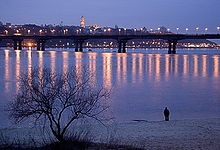
Yes, at night, Kiev really does look this beautiful. The river is the Dneiper.

And this is how I remember it in the day..
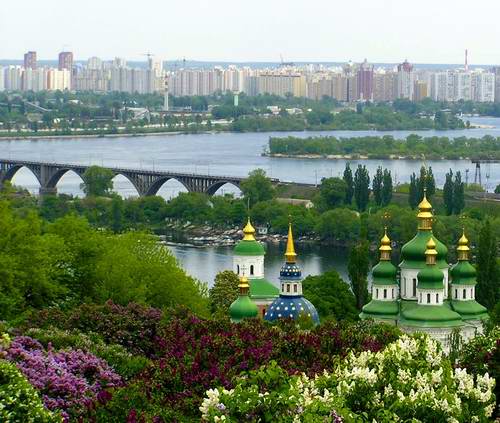
Unfortunately, I had my pocket picked - the first time ever - in a picturesque cobbled street in Kiev while looking at knick-knacks an hour before getting on the coach back to Minsk. (Which reminds me: at the border between Belarus and Ukraine, we had to wait for over 3 hours at immigration - each way!) My money problems meant that instead of flying home direct to London from Minsk, I needed to get a cheap train to Vilnius in Lithuania and flew home from there. Well, thanks to Motiejus, Anjun, Rita and Anjun, Couch-surfers who put me up in their flat for a couple of nights.
Vilnius has a long history. Perhaps most interestingly, it was subject to claims by three states after World War Two: Poland, Lithuania and Belarus. Belarus was a modest modern state, making few historical claims, although for the past century, including its time within the Soviet Union, Vilnius was a centre of Belarusian culture. Poland referred back to the Commonwealth of the Kingdom of Poland and the Grand Duchy of Lithuania, in the Middle Ages the largest state in Europe but one which was partitioned by Russia, Prussia (the eastern German state) and Austria-Hungary in the late eighteenth century. Lithuania made the most effective call to national consciousness by harking back to the Grand Duchy before the days of its union with Poland in the sixteenth century; the Lithuanian state flourished by itself from the 12th to 13th century. Poland as a post WW2 state was generous in its approach to its neighbours and so, with Belarus being modest in its claims, Lithuania successfully claimed Vilnius.
Vilnius as a city has been preserved in its medieval beauty. It would appear, however, that this was because Lithuania did not fight its occupiers, Soviet and later Nazi. Given that many Lithuanians actively assisted the Nazi occupiers in systematically massacring Jews, its referral to genocide as being largely a matter of the Soviet repression of Lithuanians suggests a desire to take a rather blinkered view to its modern history. The preoccupation of many Lithuanians with the tendency of elderly Russian speakers not to learn Lithuanian and denying them passports casts a shadow over a generally pleasant and welcoming city. I would still like to thank people for my enjoyable stay.
Here are some pictures of beautiful Vilnius:
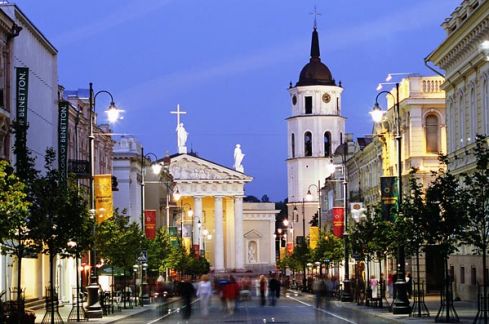



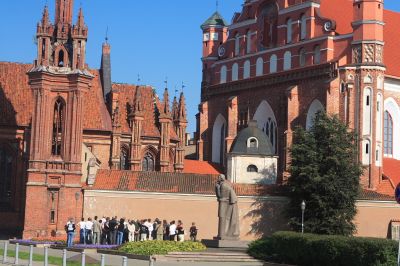
The University of Vilnius, founded in 1571, is a tourist attraction in its own right, largely open to the public. Below is the grand courtyard.
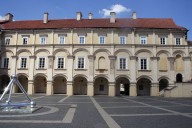
Which brings me to Wielun, Poland, which was rebuilt as a smart modern town, but one with a quiet grace to it.
Here is the town square:
For the citizens of Wielun, the war did not reach the citizens by radio..
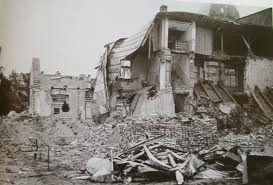
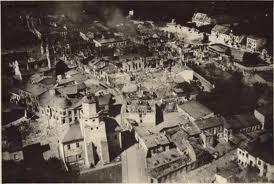
Generally, I find the people friendly, only getting the bum's rush by a shop assistant at LIDL's and a waiter at the poshest restaurant in town.
Returning to the war, it should be noted that for a long time, the place known as the first victim of German bombardment was Westerplatte. Wielun was found to have been hit 5 minutes beforehand. The town was close to the German border in those days. The discovery that it was the first to be bombarded has been seized upon with great gusto and the town now has many monuments as well as the several sites where the foundations of its older buildings have been preserved.
Beneath, one can see a monument to the air raids.
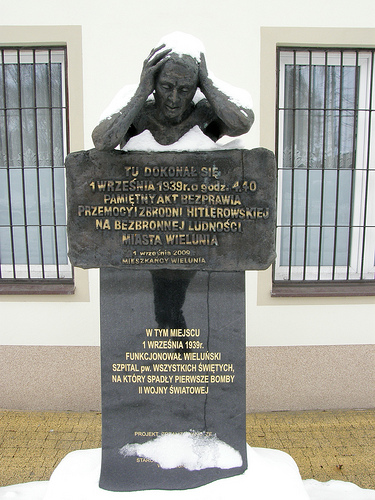
This is just around the corner from the college hall of residence where I live. The college stands on the site of a clearly marked hospital which the Nazis destroyed.
As elsewhere in Poland and other countries, worse was to come. Wielun's Jews were held in a ghetto between 1940 and 1942, before all were done in. Below is one of the monuments to the Jews of Wielun. It is referred to here as Hitler's pogrom.
From what I can gather, Germans and Russians are not well liked in these parts, although the Russians are considered worse. This may relate to their being more recent oppressors, but may also relate to their failure to come to grips with their part in events; the massacre of eminent members of Polish society in Katyn forest has only recently been admitted to as a Soviet rather than a Nazi crime.
One amusing thing is the sign in English accompanying a monument commemorating the Luftwaffe's visit. It refers to Wielun being bombed on the first of September 2010. Very persistent, these Germans!
The Roman Catholic church is becoming deeply unpopular with a significant proportion of the population of Poland. As well as the paedophile scandals which have dogged the church here as well as in far away countries such as Ireland and the USA, the sight of priests driving around in luxury cars has attracted considerable comment. This brings to mind the pre-reformation criticisms of the church in writings such as Geoffrey Chaucer's [i]Canterbury Tales[/i] in 14th century England. Before one starts to consider today's Church of England as in some way fundamentally different, the balefulness of Puritan England and America in the past needs to be borne in mind, as do the realities of present-day authoritarianism in the African Anglican church and the money-grabbing and ultra-right wing tendencies in USA Christianity. How can we be at all sure that a C of E without its current problem, a dwindling congregation, would maintain its current liberalism?
Returning to Poland, it should also be noted that there is a radio station of a distinctly religious bent which calls for the extermination of Jews, the execution of people who do not attend church, etc. The more liberal Poles note with some alarm that the Church does nothing to condemn these incitements.
More than once, I have seen a Star of David daubed on a wall. As these are not usually acts of homage, I am inclined to believe that antisemitism still has its adherents in these parts. This is particularly strange given that Wielun has not had a Jewish community since the Holocaust.
Moving away from religion but still in the area of intercommunal loathing, I note that many Poles express a disliking of Russians, primarily based on history. As we know from various wars and atrocities, this is not the most promising of attitudes..
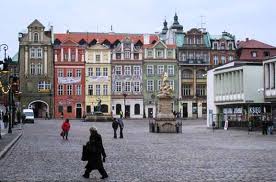
I had a great meal in an old-fashioned Jewish restaurant, Cymes, on Ulica Wozna (ulica is Polish for 'Street' as with the Russian ulitsa), well worth a visit if you happen to be town. However, the old-fashioned feel of Poznan is a little misleading; the streets were rebuilt after the second world war. Michael Palin's documentary journey across Poland suggests that this is not uncommon.
Leaving Poland again, on my journey to Kiev in Ukraine, I had to get a bus to Wroclaw (pronounced something like Rosschlav) and then stayed overnight prior to catching the through train to Kiev in the early morning. One of the delights of travelling through Poland is, as in England, not having to show your passport every time you want to buy a ticket or board a train. This is in stark contrast to ID-heavy CIS countries. Another pleasure, if you don't mind sharing rooms, is staying in a Polish hostel. I particularly enjoyed my time in Wroclaw's Babel Hostel. Staff and customers handed each other slices of take-away pizza, helped each other get online and a generally cheery time was had by all who wanted it. Ok, only corn flakes for breakfast, but for a very cheap place to rest, there was a good shower, towel provided, maps and guides of the area and any amount of advice.
Wroclaw city centre in the evening is a grand place.
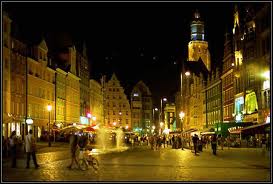
This is Wroclaw square.
Like most Polish cities, Wroclaw delights in its modernity, with restaurants offering cuisine from around the world (even little Wielun offers a rather good Asian restaurant, with Vietnamese, Chinese and Thai dishes). Wroclaw also has a theatre with English comedy in Polish translation. It also has some magnificent buildings, generally flocked around at night by cheerful people of all ages.
Here is a picture of Wroclaw City Hall.
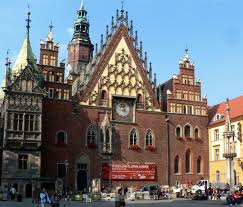
In the morning I managed to miss the through train to Kiev. To my relief, I was told that a local train would eventually catch up with my reserved train (no, I don't know how Polish trains work, other than that they aren't like anybody else's). It turned out that I wouldn't have to pay any more, with only the hassle of explaining to conductors and getting off at the right stop. I had, however, to wait for a couple of hours at Wroclaw railway station.
This was for me a worthwhile experience, as I met the community of the poor. Perhaps a dozen middle-aged and elderly people roamed around the station, keeping warm. Some sat quietly next to their bag, as if waiting for a train. I only realised after several minutes that the prim old lady next to me had a tear in the shoulder of her coat. I gave her 20 zloty (between 4 and 5 pounds).
My heart sank when she called a somewhat younger but still middle-aged woman and passed her my note. Surely not a geriatric begging cartel? Given that my money had not in any way been elicited, this was a truly unworthy thought. So it proved. Five minutes later, her friend returned with a filled pastry for her, and then a cup of tea with her change.
In turn, the fitter lady was greeted by a man of a similar age. These were nice people, their tea being taken in a ticket hall. As in many east European countries, the transition from communism to capitalism has left elderly people in trouble.
My last sighting of this shivering community was another member going for a lie-down in a cove near the rubbish bins.